|
[Previous
PageJ
COTTON FOWD.
|
WE han some funny
folk i' Cotton Fowd.
We'n big an' little folk, an' young an' owd;
We'n short an' tall uns too, an' fat an' smo;
So if yo' like I'll write abeawt 'em o'.
Eawr Cotton Fowd ull bow the knee to
noan,
It has a sort o' kingdom of its own;
We'n thick yeds, bawd yeds, bacon-yured
an' curled.
It tak's o' sorts o' folk to make a world.
Well first of o', i'th' middle house,
Next dur to Rovin Joe,
There lives a chap wi' tons o' sense,
He thinks he has it o'.
Yo'll never find him worchin' hard,
He's swanky, yo con see.
He's what they coen howd on a bit
I think that beggar's me.
I' th' corner house there lives a chap
Who's never tasted boose.
For, when he isno mindin' mules;
He minds his P's an' Q's.
He's gettin' rayther wake i' th' yed,
An' wackery at th' knees.
He's brass enough to live retire;
He will do when he dees.
Next dur to him lives Bob o' Sups,
He's allus seekin' trouble,
He conno' see mich good i' life,
Unless he's seein' double.
Last week he supped his Sunday shoon,
It's time he geet some new uns.
He conno keep his spirits up:
And what he has are blue uns.
I' that big heawse at top o' th' hill,
There lives a millionaire.
He's o' his loaves an' muffins baked,
His mind is free fro care.
There's some think he's an angel, an'
He looks it yo' con bet.
He happen wears a halo, but
I havno fun it yet.
He wears tay-party whiskers an'
They hang deawn on his chest.
They say he's quite as gentleman,
I reckon he knows best.
He never looks at sich as me,
He's one o'th upper class.
I dunno like his whiskers, but
I weesh I had his brass.
A poor owd widow lives next dur;
Hoo's welly, seventy-eight.
To keep hersel' alive at o',
Hoo fairly has to feight.
Hoo does a bit of charrin', then
Hoo goes round sellin' barm.
Of course hoo gets her pension, so
Hoo winno' tak' mich harm.
At number nine, next dur to t' church,
There lives a nice owd maid.
Hoo's very fond of gossipin,
Hoo mak's it in 'a trade.
Hoo's what they coen religious, an'
Hoo goes to t' Sunday schoo.
If onybody plays new tricks,
Hoo'll curse 'em till they're blue.
Hoo's allus havin' bits o' fraps,
Wi' thoose at number seven.
By th' way hoo gets her dander up,
Hoo'll never go to Heaven.
Hoo towd a woman tother day,
Hoo'd knock her off her perch,
But this owd maid's a chapeller,
While t' woman goes to t' church.
We han a little shop an' o',
Its kept bi Mester Cant;
He'll sell yo' owt yo' may require,
And things yo'll never want.
O'th folks i' th' Fowd look up to him,
They sen he's gettin' rich.
It's not becose he's clever, it's
Wi' chargin folks too mich.
O' keepin' friends wi' every one
He seems to have a knack.
When onybody goes i'th shop
He smiles o' down his back.
Yo' owt to yer him singin' hymns,
He gets 'em off his chest;
An' like a good church warden, he
Con sing "Amen" wi' th' best.
A widow woman lives next dur,
They coen her Mrs. Green.
Hoo has a lot childer too,
I think hoo's seventeen.
If childer are a blessin, well,
Moor sweet 'ud be their cup,
If poor folks childer o' were born
Wi' brass to bring 'em up.
We'n funny folks i' Cotton Fowd,
Some wrong, an' others reet,
They're nobbut humans after o',
There's noan of us so breet.
There's clever Dick an' crazy Joe,
An' others I could tell.
But what's the use o' sayin' moor,
Yo'n o' met sich yorsel. |
――――♦――――
THAT GOOD
OWD 'TATO-PIE.
|
"Now the Christmas feasting is at an end,
Lancashire folks will be glad to go back
to their favourite dish, to wit, potato-pie."
― Daily paper.
THERE'S
nowt con beat that steamy seet,
That good owd 'tato-pie;
We connot ate yo'r fancy mate,
In fact, we never try;
Yo'r foreign folderdols may be
O' gradely classy pedigree,
They're happen grand, but give to me
That good owd
'tato-pie.
Thoose fancy tarts, so dear to hearts
O' ladies slim an' shy,
Are good maybe, but, dear o' me!
They dunno' satisfy;
There's some who nobbut seem to care
For prime ragouts o' goose an' hare,
They'r welcome, if they'll nobbut spare
That good owd
'tato-pie.
It's sweet an' good, I weesh yo' could
Just see eawr childer, why!
It's quite a treat, a happy seet,
To watch 'em mak' it fly;
The'r very platters dance wi' glee,
It never wants no mortgagee,
For when they'n done yo' winno' see
Mich good owd
'tato-pie.
I nobbut weesh yo'd try a deesh,
An' then see heaw yo? feel;
Yo' murn't suppose it's chep, becose
There's beef in it as weel;
It's covered o'er wi' juicy crust,
An' if yo'll tak' a plate on trust
Yo'll feel as if yo'd like to bust
Wi' good owd
'tato-pie.
So if this deesh should meet yo'r een,
I hope yo'll taste an' try;
It's good for oather king or queen,
There's no'bd'y con deny;
So tak' yo'r lamb 'at blooms i' Spring,
Yo'r turkey leg an' pigeon's wing,
Nay, gentle cook, tak' everything,
But save eawr
'tato-pie. |
――――♦――――
YONDER MOOR.
|
EH, dear, I am a
crazy foo;
I'm snoozin' in a drain;
Wi' sittin' sottin' deawn a broo,
I've cobwebs on my brain;
My flabby flesh is dull an' dense,
My blood feels wake an' poor,
An' o' becose I havno' sense
To get o'er yonder moor.
I'll jow my yed, get eawt o' bed,
An' climb o'er yonder moor.
My voice is getten wake someheaw;
Eh, dear! I am a clown;
I conno' mak' folks yer me neaw;
My circulation's deawn.
I'm like a brokken-winded bear;
I must be daft, I'm sure,
Becose I know there's lots of air
To sniff on yonder moor.
I'll swell my chest an' do my best
To climb o'er yonder moor!
I'm droppin' deawn to Davy Jones;
I'm like a lump o' lead.
Oh! dang my crazy, lazy bones;
Oh! hang my dozy yed.
Wi' dozin' in this dirty dell
I've made misel a boor;
I've hawf a mind to kick misel
O th' road o'er yonder moor.
I'm rank an' bad; gee up, my lad;
Trot off o'er yonder moor.
I'm gooin' in a bit, yo'll see;
I'll shift this muddled brain;
I'll tak' my dog for company;
Th' owd lad 'ull look so fain.
Na' watch him wag his hail an' jump;
He knows, he does for sure,
It's bown to shift my lazy hump
On th' top o' yonder moor.
Come, Towzer lad. Na' don't go mad;
We'll romp o'er yonder moor.
Ah! here we are. Neaw, Towzer, hey,
Just sniff at that; there's air;
This moorland breeze is noan so bad;
It's chep, so get thy share.
Eh! th' sky up here's a dream o' bliss,
It's clearer, mon, an' bluer;
Yo' towny folks just hearken this
Get eawt o'er yonder moor.
No dirt an' strife! Eh, lads, it's life,
To romp on yonder moor.
Here's tonic of a gradely sort,
There's physic in this wynt;
Yo'd gladly pay a doctor for't
Who charged so mich a pint.
Owd Nature's a dispenser here,
Man's oft an evil-doer;
Be hanged to mon-made atmosphere,
Go breathe on yonder moor.
It's fine! It's free! Why long to dee?
There's life on yonder moor. |
――――♦――――
EAWR LANCASHIRE
DIALECT.
|
NEAW if yo'r
wantin' what they co'n a literary treat,
Eawr Dialect o' Lancashire is very hard to beat;
It has a gradely pedigree; it's gradely there's no doubt;
Yo'll find it gradely jannock if yo'll nobbut root it eawt.
It's dressed i' Warty clooas but it has a Sunday shine;
It's better nor yo'r modern slang 'at some co' talkin' fine.
It has no vain pretentions but yo'll find it's gradely made;
It's honest in its dealin's, an' it co'es a spade a spade.
It's sound in every letter; an' it has an honest ring;
In fact I think it's good enough for oather Queen or King.
Before eawr Loyal dialect let's make eawr humble bow;
It's good for makkin' love wi' an' it's useful in a row;
What language con be sweeter when to Mary we exclaim:
"Eh lass! I love thi gradely weel; when will ta change
thy
name?"
It's heavenly when hoo answers, in eawr dialect sublime, ―
"Eh Jammy, tha'rt a darlin, an' I'll wed thi ony time!"
It's gradely when hoo chuckles at eawr little human ways ―
"Oh Jammy, stop thy squeezing, or tha'rt bown to break
my stays."
Eawrs is a lovely language, an' it goes straight to yor heart,
If folks geet wed i'th' dialect they'd never want to part.
It's helped to rear some gradely folks; it's simple, but it's
true;
They met do worse than teych it little childer when at schoo.
At owd an' foreign lingo I'm surprised they dunno' kick;
Dead languages are nowt a pound to folks who're gradely
wick;
We never say a chap's a "bally rotter," if it's true:
We'd rayther co' him what he is, a gradely gawmless foo.
When laudin' summat 'at we like, rude English waint suffice;
We sen, "By gum it's champion," an' noane "It's awfully
nice."
We don't believe i' college words 'at mak' a chap feel big;
We never say "Bon jour, old chap" "Au fait" an' "Infra
dig"!
We dont' believe i' mongrel talk; eawr words are allus breet,
We say "How do!" an' "gradely!" "Heaws thy feyther!"
an' "Good
neet."
Their spread of Education's fro' a jumped up modern germ;
We get eawr Lanky Dialect fro' an' owd established firm.
We greet a friend wi' gradely talk. It's simple, but
it's sure;
We never axe who cut his hair, we shout "who powed ti'
yure?"
An' if he gets his yure off, well, he is a sort o' mug:
He'd happen underston us if we saidwe'd clout his lug;
For him to show his ignorance is one o'th' worst o' sins;
He would be flummaxed if we said we'd purr him off his pins.
Eawr dialect o' Lancashire's complete, it's one o'th' best;
It's good for nursin' childer wi', or layin' folks to rest.
A mother soothes her babbies wi' it; cheers 'em when they
weep;
Wi' little Lanky lullabies hoo' rocks 'em o' to sleep.
Hoo uses it when in her prayers hoo says:"Greyt God above
Watch o'er my bonny babbies wi' Thy gradely wondrous
love."
Hoo uses it each momin' wi' her love so good an' true;
"Come, Jimmy, love, let's wesh thy neck an' get thi off
to't' schoo'!"
An' "Polly comb that yure eawt, an' brush thoose dirty
shoon;
An' goo an' wesh that face again, tha's nobbut gone reawnd
th' moon."
"An' Jack, hitch up thy galluses; poo' up thy socks! an' Joe:
Just thee keep eawt o' mischief or I'll let thy feyther know."
Yo'r grammar schoo's an' colleges han turned eawt mony a
gawk;
There's lots o' English gentlemen reared up on Lanky talk.
Wi' o' respects to thoose who breyk their necks wi' talkin'
fine,
Gi' me eawr gradely dialect so human an' divine;
It's paved the way for mony a mon; an' kept 'em straight
through life;
It's getten mony a partin', an' it's hitched up mony a wife.
It's good for honest dealin', noane for talkin' through yo'r het,
In short it's built up Lancashire an' there's no flies on that.
Some folks may co' it lowerin', uncivilised, an' rough;
What price eawr factory chimneys? bless my soul! they're
heigh enough.
It's good for crackin' jokes wi' it's like mustard to a meal;
A tale 'at's towd i'th' dialect is seasoned gradely weel.
It's gradely, an' it's perfect; as complete as th' number seven;
It's good for bringin' folks on earth, or showin' th' road to
heaven.
It's fit to sing a' anthem in; a prayer; or sacred song;
I shouldna wonder if it's sung wi' that grand angel throng.
It's good enough for rich an' poor; for Emperor, or Shah
So if yo' think it's gradely put yo'r hond up, an' say "Aye!" |
――――♦――――
THE TIGER
INN AT
AUSTERLANDS.
|
I'LL
sing yo' a song of an animal rare,
That lives at th' side of a broo;
And treats everybody that gets in his lair
To a song and a rare good do;
It's rayther owd-fashioned but comely an' clen,
It's cosy there's never a doubt,
An' should yo' get gradely stuck in his den
Yo've jolly hard wark to get eawt.
Th' owd Tiger 'ill welcome yo' every neet
So long as yo' dunnot get tight,
An' if yo'll behave in a manner 'at's reet
It'll noather get savage nor bite;
So visit the den o' this animal dear,
It's mild as a lamb in its laws,
An' though it's a tiger yo've little to fear
Whenever yo' get in his claws. |
――――♦――――
SNOBBERY.
|
"There are quite as many snobs among so-called Democracy as in any
other class in the country."
"The Rambler." |
|
Of all the frailties of mankind ― and many stand accurst ―
I think, with me, you'll surely findthe snob is 'praps the
worst.
Just look around and then you'll see ― though 'praps not as
as a rule,
A little brief authority can make a man a fool.
The gutter-child will cock his nose at little brother Pee,
Because the latter in his hose has got more holes than he.
Why does the builder daily cut the hod-man he has met,
Without whose aid the snobby strut would have not bricks
to set?
Yet why should any snob be feared? No matter if he bust:
The biggest snob that ever sneered is but a speck of dust.
The one who holds the winning suit should never use his lip;
A fellow needn't be a brute because he owns a whip.
Why should the ruler, from his height, be swanky or unjust?
The dustman is as useful quite as one who makes the dust.
The rantipole of time is queer, and swanking doesn't pay;
The howling snob of yesteryear may be a sneak to-day.
The snob, maybe, enjoys the fun, but though his future
bright is,
My heart goes out to anyone who's burdened with snobitis.
Oh, save us from the human flea who's full of bounce and
sham,
And asks "How dare you speak to me? Don't you know
who I am?"
The best of us are only weak. When time gives us a
"sowser,"
He'll ask, if we should dare to speak, "Who are you any-
how, sir?"
Don't sneer at one who's down; tut tut! uplift him if you can:
He may be poor and lowly, but for a' that, he's a man
A man's a man, a pal's a pal; you can't make wheat of
chaff:
Whoa, snob, come off your pedestal, you only make me laugh.
Suppose you have got on in life! You needn't swell your
head:
Don't manufacture woe and strife; you'll soon be very dead.
Why should you say, in manner grand, as saucy as can be ―
"I've joined the Clique de Mushrooms and you can't ketchup
to me."
Your pal may have but eighteen pence, with trouser-knees
that shine;
You shouldn't lose your better sense because you've two-
and-nine.
Democracy will never grow to any great renown,
So long as snobby members sow the weeds that let it down. |
――――♦――――
"BASHFUL
GEORGE TAYLOR."
|
GEORGIE
TAYLOR'S
ta'en a fancy
To a girl fro' Candy Fowt;
Eh, he is so fond o' Nancy,
An' hoo likes him moor nor owt.
Lots o' times when they wer' childer,
As they walked abeawt i' th' wood,
Georgie's senses hoo'd bewilder
When hoo said "Dost like me, Jud?"
Then he'd look as shy as ony
Maiden, but hoo'd help him through;
"Georgie, doesto think I'm bonny?"
An' he'd say, "I happen do!"
Neaw they'n getten rayther bigger
Georgie loves her, there's no deawt,
But he looks a sorry figure
When he's walkin' Nancy eawt.
He wer' ne'er a lad for talkin',
An' so bashfull! Well, I've yerd,
Though he tak's her eawt o' walkin',
Georgie never speyks a word.
Neaw an' then he tries to utter
Lovin' sentences, an' sweet,
But he fails, and has to mutter
"Eh, it is a bonny neet!"
But he connot help but love her,
If his courtin's rayther queer,
An' he thinks 'at stars above her
Looken breeter when hoo's theer.
An' he must ha' ta'en her fancy,
For they're beawn t' bi married soon,
Yet it's rayther hard for Nancy,
For the beggar winno' spoon.
One dark neet when eawt o' walkin',
Nancy chuckled, lookin' shy,
"It's too dark to start o' talkin',"
Georgie simply answered "Yigh!"
Then hoo said, "Dost think tha'd miss me,
Georgie, if I wer' to flit?
Doesta never want to kiss me?"
Georgie murmured, "In a bit."
Nancy's mother co'ed her chap in
T'other mornin,' an' said, "Well!
When art beawn to start o' shappin' ―"
Georgie said, "I conno' tell."
"Conno' tell?" hoo said; "I think it's
Time tha started doin' biz:
Beighin' rings, an' bits o' trinkets,"
Georgie blushed, "It happen is."
*
*
*
*
Bashful Georgie! Happy Nancy!
Words are nowt, an' yo' con bet
If they'n ta'en each other's fancy,
They'n be happy, dunno' fret! |
――――♦――――
BE REASONABLE.
|
COME, rally up
yo'r troubles, lads,
An' get 'em off yo'r chest;
We'n little time for grievances,
Life's nobbut short at best.
Do stop yo'r crazy feightin', for
Yo'r nobbut makkin' foes.
It is a gloomy outlook when
Yo'r e'en are black wi' blows!
When dogs delight to bark an' bite
They dunno' look so glad;
Yet dogs know heaw to reason, for
They arno' allus mad.
But men are men; it's left to them
To make their heaven or hell;
So when yo' punce yo'r fellow-man
Yo' nobbut kick yo-'rsel'.
Remember when yo'r killed wi' wit
Yo'r nobbut part o' th' show;
There's other folks wi' common sense,
Yo' hanno' getten it o'.
Becose a thing is red, an' yo're
Prepared to bet it's true,
Yo' shouldna lose yo'r yed becose
Another says it's blue.
It isno' wise to knock him deawn,
Then flap yo'r wings an' crow;
For when yo'n rubbed yo'r e'en it met
Be yallow after o'.
We're quick to frame opinions of
Eawr own, an' beggar th' rest;
We're ever prone to say eawr way
O' thinkin's allus th' best.
We'st get through if we'll nobbut try
Wi' unity to win;
Two yeds are useful neaw an' then,
Though one yed's on a pin.
This life's a battle. Very oft
We're forced to lond a welt;
But let us keep fro' feightin' foul,
An' hittin' under t' belt.
Why should we slub eawr fellow-man
For every shady act?
We'n o' a bit o' devil in
Eawr natures, that's a fact.
When rue an' wormwood bar eawr way,
Let's tak' it as it comes,
For when there's nob'dy lookin' on
We pinch a tuthri plums.
I think it's silly throwin' breeks
At folks we're apt to doubt;
We'st never reconstruct a house
Wi' throwin' breeks abeawt.
Suppose we dun go short o' ale,
We needna' act like apes;
It happen isno' fit to sup;
Remember t' fox an' grapes.
Don't curse th' cowd-hearted profiteers,
Who steyl eawr beef an' corn;
Console yorsel' wi these warm words ―
"They'll get it hot to-morn!"
Do stop this throwin' slutch abeawt;
Behave like mon to mon.
We conno' carry on like this,
If we mun "carry on."
So rally up yo'r troubles, lads,
Let grief give way to laughter;
Let's give an' take, an' then we'll o'
Live happy ever after. |
――――♦――――
"KEEP JOGGIN'
ON."
|
COME up an' soap
yo'r stockin's lads, an' shoulder weel yo'r
load,
For life has lots o' cobbles on its variegated road;
It may be rough; it may be clen;
So get some gradely shoon, an' then,
Like one o' nature's gentlemen ―
Keep joggin' on!
Yo'll meet wi' folks wi' feelings, an' yo'll meet wi' folks
wi' pride;
Yo'll meet wi' good intentions, an' wi' tricks yo' cornt abide;
But sort 'em eawt an' do yo'r best;
Lift up yo'r chin, shove eawt yo'r chest;
Wi' cheery tune an' merry jest ―
Keep joggin' on!
Yo'll come across some pleasant seets to twinkle up yo'r e'e;
Yo'll come across a lot o' things yo' didno' want to see;
Yo'll meet wi' folks who're short of meight;
Yo'll meet wi' rogues yo'd like to feight;
So long as yo' keep walkin' straight ―
Keep joggin' on!
Then awlus try to help a chap 'at's deawn, for who can tell
Heaw soon yo'll want assistance should yo' tumble
yo'rsel';
An' if his jacket's noan so clen,
He may be one o' th' best o' men;
Just try to help him up, an' then ―
Keep joggin' on!
When funds are low an' times are bad it's hard to trudge
along;
But poo' yorsels together, lads, an' try to hum a song;
Yo'll never reitch yo'r journey's end
If once yo'r legs begin to bend;
Buck up! yo'll happen meet a friend ―
Keep joggin' on!
Let's make believe we like it when we han' to climb a broo';
An' try to think it helps us if we have a corn or two;
If there's a blister on our heel,
We'll smile an' say, "we're waikin' weel."
We'll think it's nobbut th' "bliss" we feel ―
Keep joggin' on!
At times yo' may feel lonely when there's ne'er a soul i'th'
seet;
Dark clouds may gather reawnd yo'r heart, an' grief weigh
deawn yo'r
feet;
But sure as good owd Sol con set,
The day will come, so dunno' fret;
It's never missed a dawnin' yet ―
Keep joggin' on!
It isno' wise to walk alone, an' fratchin' doesna' pay;
Let's jog along in harmony to help us on eawr way;
Heaw long it is we dunno know,
At times we feel to travel slow,
But till we're landed may we o' ―
Keep joggin' on! |
――――♦――――
AN OPTIMISTIC
OUTLOOK.
ONE SORT OF A MARTYR.
|
"WELL, Jammy,
lad, wheer are we beawn?
It's Wakes next week tha knows.
I know we're short o' money, but
We munno sit an' dose.
We'll have a ramble up i' th' park,
Or loll abeawt i'th' lanes;
I dunno' care for gooin' off
I' charabangs an' trains.
I see no fun i' crushin' just
To get a smell o'th' say;
I'd rayther be a' whoam ― an' then
We corn't afford to pay.
Tha knows heaw mich tha's addled, so
Tha shouldna be surprised,
I've had to skimp it ever sin'
Tha geet demobilised.
But, happen, if we'll nobbut try,
We shanno' fare so bad;
They conno' corner sun an' air,
Cheer up! what says ta, lad?
Eawr troubles han bin heavy, but
We'll try to bear eawr yoke;
We hanno' had big wages, like
A lot o' workin' folk.
I know tha has a pension, but
It's noan enoughnot it.
Eawr Bill, poor lad, went under, or
He might ha' helped a bit.
I know tha connot help it, but
To sit an' mope is wrong;
Tha'll happen use thy hond again
Before so very long.
Eawr Johnny thinks we're gooin' off';
He'll blubber, I'm afraid,
Tha'm tak' him i' th' sondhole wi'
A bucket an' a spade.
Eawr Mally too 'ud like a change,
Hoo's getten very pale;
Her bein' short o' gradely meyt
Has towd a weary tale.
But cheer up, lad, we'st live it through;
Tha'd like a change I know;
I dunno care a bit to goo
Away this time at o'l
Who cares for sands an' promenades?
It's nobbut swank an' show.
I'd rayther ramble o'er yon hills
Nor onywheer I know.
I know that good owd heart o' thine
Feels welly fit to break;
Come, jammy, let's be optimists!
Cheer up, for th' childers' sake!
Tha'm tak' 'em o' i' th' park; they'll be
As happy as a king.
Eawr Bob 'ull fairly revel
If tha'll put him on a swing.
Yo'm go to th' fair this afternoon,
I'll bet yo'll ha' some fun;
An' go i' th' dean o' Monday while
I get my weshin' done.
O' Tuesday, while yo' han a walk,
Or sit an' rowl on th' grass,
I'll do a bit o' sewin' for
Owd Mrs. Taylor's lass.
Goo eawt an' get some good fresh air,
Then, when yo'n had yo'r fill,
At neet I'll try to trate thee while
Tha goes an' ha's thy gill.
Cheer up! we'll have a Wakes tha'll see!
We'st manage, I'll be bound;
Wait till we get o'er yonder hills!
Why, Blackpool's nowt a pound.
Eh, lad we'll have a gradely time,
Cheer up, come, Jammy, come:
Who cares for silver says an' proms?
We'st ha' moor fun a'whoam.
Be hanged to crowdin' into trains;
It conno' do mich good.
I know tha'd rayther stop a'whoam
Come, Jammy, say tha would.
Mak' up thy mind to have a time,
I'll work it; bet on me!
I'm fain we areno' gooin' off
We'll have a Wakes tha'll see!
*
*
*
*
*
God bless her for her sort o' lies;
Hoo's brave, without a deawt;
Hoo's one o' th' many martyrs 'at
We sometimes read abeawt.
Yo' noble Dukes an' Duchesses,
Who laugh poor folks to scorn,
May think yo' known what life is but
Yo' dunno' know yo'r born! |
――――♦――――
BE HUMAN.
|
COME, brother,
please remember, while
You play your human part,
One little spark of sympathy
May warm the coolest heart.
Say soothing words and solaces
With all your fleeting breath;
Your touch of pity yet may save
A sinking soul from death.
And speak not harshly, lest there be
Some breaking spirit there;
Your one kind word may help to cheer
A mind in dark despair.
Illumine well your brother's "night,"
Your "day" is never sure:
Be wise, and practise tolerance
If you would aye endure.
And wear a blessing on your lips,
And kindness in your eyes,
And let not hatred sear your soul,
Nor brutal passions rise.
Be ever ready to uplift
The fallen while you can;
Scorn empty fame, and rather wear
That nobler name of Man.
Don't eulogise the busy bees,
Then mingle with the drones;
Seek not to build your pedestal
From weaker brothers' bones.
Don't burden him with all your faults ―
He has his worries, too;
And don't forget he has the right
To live as well as you.
Seek not to bind him with your chains,
E'en as you would be free;
Remember he is not a dog,
So treat him humanly.
You, too, may still have time to droop,
So grant him, e'er he fade,
A kindly word, a cheering smile,
A touch of human aid.
Your deeds will all be written down
In that great Book above;
Scorn puny hate, and cultivate
That nobler thing called Love! |
――――♦――――
HEAW'S TH'
BRASS, LADS?
|
LOOK at my
pocket, lads; eh dear!
Hardly a bob, an' Whissundy's here.
Look at my hat, and look at my chivvy,
Longin' for holidays, never a divi.
True, I've a Fisher or two, but it's hid;
Heaw art tha gooin' on? Lend us a quid.
Look at my pocket, lads: By gum,
Lend us a bob or I'm stoppin' o' whoam.
Who's ony brass? It's good to see
Somebody has a lot, why not me?
Everyone's takkin, an' nobody givin';
This is a lond fit for heroes to live in.
Look at my pocket, what conta see?
Nobody's worched ony harder nor me;
Nobody's fowt ony harder to win
Liberty's war, an' I think it's a sin
Ony chap battered abeawt wi' a rocket
Has to goo off wi' a hole in his pocket.
Heaw's yor brass, lads? are yo' rich?
I'll bet a penny yo' hanno' so mich.
Doles an' dollars, dollars an' doles,
Shoes i' pawn, an' stockin's i' holes.
Odd brass gone, an' Whissundy here,
Droylsden prom. or Blackpool pier.
But dunno' dee off i' shivvers an' shakes,
Tighten yo'r belt an' wait till t' Wakes.
Say-breeze is chep enough, that yo'll confess;
Sniff a bit moor an' spend a bit less.
Little for theatres, little to sup,
Hang it, we'st manage, so blow it; cheer up!
It's no good o' skrikin' an' growsin' o' this'n:
Let's do eawr best to be happy this Whissun. |
――――♦――――
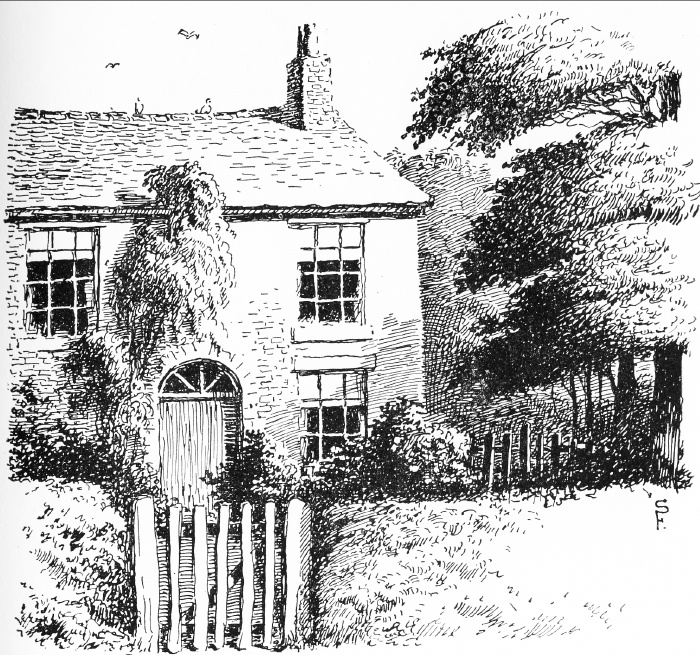
The birthplace of Sam Fitton.
CHEER UP,
MOTHER.
|
COME, mother,
dunno' look so glum,
Just poo yo'rself together;
These clouds are sure to vanish, come,
Let's hope for fairer weather.
I know yo'n had a lot to bear
Wi' one thing an' another;
But dunno' fo beneath yo'r care,
Keep up yo'r pecker, mother.
Eh, lass, I know yo'n had a job
To rear yo'r little Lizzie;
An' there's yo'r youngest, little Bob,
He's kept yo' rather busy.
I know yo'n oft gone short o' meyt,
At best yo'r never wealthy;
An' for a while it's bin a feyt
To keep yo'r childer healthy.
Yo'n done yo'r duty, be at rest
Neaw dunno' get so flurried
If everybody did their best
Yo' wou1dno' look so worried.
Yo'n had some burdens in yo'r yoke,
It's welly bent yo' double;
Through t' tricks o' trade an' greedy folk
Yo'n borne a lot o' trouble.
Why conno' folks be good? By gum,
It welly makes me skrike;
Through selfishness there's troubles come
To rich an' poor alike:
Why dun we barge an' disagree,
An' make eawr friend eawr foe?
A bit o' Christian charity
Is better for us o'.
This life is but a little tale;
Why should we grunt an' harry?
For th' best of us are nobbut frail,
We hanno' long to tarry.
When th' road o' life is hard an' rough,
Let's smooth it, noan forsake it;
When trouble comes it's soon enough,
Why should we stoop to make it?
Despair con nobbut gain a shroud,
There's little gained wi' mopin';
There's lots o' sun behind a cloud,
So mother, keep on hopin'.
There may be bitters in yo'r cup,
But singin' brids are hummin',
So, mother, keep yo'r pecker up,
For better times are comin'. |
――――♦――――
WIDOW BEWITCHED.
BILL AND JOE
|
IT was a fine
summer Saturday afternoon in a Lancashire cotton town. The streets
were gaily bedecked with multi-coloured flags and bunting, for it
was a gala day. Bands of music and a procession of tableaux,
cyclists in character, tradesmen's turnouts, etc., was the order of
the day.
Mrs. Buckley, a buxom widow, was busily adorning her plump figure
with the finest habiliments her wardrobe contained, for, as she
said, "I mun mak' misel' look dacent for this day of o' others, for
this is to be a red-letter day i' moor senses than one. I mun hurry
up; th' band's comin', an' there's sure to be a crowd o' fine folks abeawt.
I do hope nobody comes o' botherin' me. I'm gettin' rayther
too mony male visitors o' lately especially owd widowers be
hanged to 'em, they'n bin wor' nor bluebottles round a honeypot ever
sin' some little brid or other towd 'em I'd had two hundred pounds
left me. Hello; theer's a knock whoever's comin'? Come in."
It was none other than old Joe Grimshaw, one of her many old-time
admirers.
"Oh! It's thee, Joe Grimshaw, is it?"
"Aie! It's me, what's left on me!"
"There's a bit left yet, Joe, what does ta' want?"
"Well, to tell thee t' truth, lass, I'm after thee."
"After me? An' what does ta' want me for? Be sharp if tha's owt to
say, I've somewheer to goo. Besides, th' parades comin."
"Aye," said Joe sheepishly, "I con yer th' band. I reckon I con stop
an' watch it through th' window?"
"I reckon tha conna; I'm gooin' eawt. Tha's done rayther too much
comin' here sin' my husband died, Joe Grimshaw."
"Well, it 'ud ha' looked so if I'd ha' com'd while he were wick."
"An' I notice tha's com'd rayther oftener sin' my Uncle Ralph left
me that two-hundred pounds."
"Did he?"
"Did he? Tha's yerd abeawt it mon. Be off wi' thee. Tha, conno' get
round me, Mester Grimshaw."
"Oh hang it, co' me Joe; tha used to co' me Joe once, Mrs. Buckley!"
"Well, tha coes me Mrs. Buckley, doesna' tha?"
Joe sheepishly toyed with his hat, then he longingly leered.
"I know what I should like to co' thee!"
"An' whatever's that pray?" queried the widow impatiently.
"I wish tha'd let me co' thi Mrs. Grimshaw!"
"Geroff wi' thi bother. I'll get th' row1in' pin to thee if tha
arn't off, tha greyt softy!"
"Ann, I know I'm soft, but every time I think abeawt thi bonny face
."
"An' my two-hundred pounds!"
"Ann, two-hundred pounds are nowt to me."
"That's one good job, but I'm gooin' ."
"But wait a minute, Ann. Tha'll happen change thi opinion when tha
."
"I'st change nowt!"
"Not even thy socks?"
"Nawe, an' I shanno? change my name! I'm Mrs. Buckley
today, an' I'st be Mrs. Buckley to-morn! Neaw off wi' thee, I'm gooin' to put
my hat on."
"O' reet, I'll goo for th' present; give us just one little smack
before I goo!"
"Be off wi' thi bother."
"Just one, Ann!"
"Then, theer it is!"
A hard souse on the cheek sent him back a couple of yards.
On going towards the door he discovered it was open, and there in
the doorway he met with a rival in the shape of old Bill Robishaw, a
one-time friend of his. Old Joe Grimshaw evidently was much
perturbed by the entrance of Bill Robishaw. He looked upon him
as an interloper encroaching on his possible preserves.
"What does tha want?" he growled.
"What's tha want to know for?"
"I didn't want to know, I were nobbut axin!"
"Well, don't axe then!"
"Don't get thi hair off!"
"An' don't get thy hair off."
After a short pause foe again essayed:
"Wheer does ta reckon tha'rt gooin'?"
"I'm noan gooin, I've come," answered the irate Bill.
"I see tha has." A pause, then: "It's a nice day isn't
it?"
"Th' day's reet enough; there's nobody touchin' it!"
"Well, I think I'll be gooin'!"
"Good afternoon."
"I haven't gone yet!" said the disconsolate Grimshaw.
Eventually Joe went out, leaving Bill alone with the widow,
who asked:
"Well, an' what does Bill Robishaw want?"
"Well, er I thowt I'd just pop in!"
"Didta? Well tha con just pop eawt again. So shut
that door, an' shut it fro't' tother side too. Yo'n welly worn
away my durstep o' lately. Come, toddle off. I'm gooin'
an errand an' I'm late as it is."
"Tha con happen spare a minute?"
"Not a second; I want no chaps. Is it me tha wants or
two hundred pounds?"
"Eh, bless thi, lass, I want noan o' thi money. I've
nobbut coe'd to have a chat for owd times sake, Ann I reckon I con
co thi Ann?"
"Nawe, tha connot, Mrs. Buckley's my name, both neaw an' for
ever. I shannot change my name for nobody, off wi' thee.
I never did like thee, Bill."
"Nay, don't say that, Ann. Tha knows what fun we had
when we used to weive at side o' one another."
"Had we?"
"Well, hadno' we?"
"I'd forgetten."
"Forgetten? Ann I meaon Mrs. Buckley nawe.
Ann. Hang it, I will co' thi Ann!"
"Well, be sharp an' get it off thi chest."
"That's what I want to do, lass. It's troublin' me some
badly,"
"Poor owd felly. I thowt tha sounded wheezy. I'm
sorry I haven't a lung healer for thi."
"Lung healer? Phaw! Ann, it's a heart healer I
want. I've sich a funny feelin' under mi westcoat, Ann."
"I'm sorry; hasto tried Belladonna plester?"
"Belladonna fiddlesticks! Ann, say tha'll ha' me.
I'm deein' for thi."
"Get eawtside, an' goo an' join th' parade. Come on
neaw, I want to lock up."
"Well, say tha'll be Mrs. Robishaw."
"Nawe, never."
"Never? That's a greyt while, Ann. But tha'rt
happen beawn to be Mrs. Grimshaw, arta?"
"Nawe, I'm Mrs. Buckley I tell thi, an' Mrs. Buckley I'm
beawn to remain. Neaw get eautside, or I'll hit thee!"
"Mun I hit him for thee, Ann?"
It was Joe Grimshaw, who had returned for the umbrella he had
purposely forgot to take with him.
Bill was raging.
"Joe Grimshaw, the devill" he ejaculated.
"Aye," retorted Joe. "An' Bill Robishaw's a bit of a
devil, too, it seems."
Mrs. Buckley tried to refrain from chuckling as she went in
the kitchen and left them to it. Old Grimshaw resumed:
"What reet has tha to come in here o' tryin' to upset the
peaceful household of a respectable widow woman like Mrs. Buckley?"
"I've th' same reet as tha has when tha comes o' reckonin' to
tell her tha loves her, when tha knows very weel it's nobbut her bit
o' money tha'rt after. Joe Grimshaw, tha'rt a heartless
schamer. A Don Juhanna of a adventurer, an' I've a good mind
to put thi eawt."
"Put me eawt! Put me eawt! I'm put eawt enough wi'
seein' thy feaw face hangin' abeawt o'er th' hearthstone 'at owd
late Mester Joe Buckley spent his happy married life on, till fate
carried him off. Why, it's enough to mak' th' owd chap turn
o'er in his grave. Goo eawt, Bill. Ann doesn't want
thee, mon."
"An' I'm jolly well sure hoo winnot ha' thee."
At this juncture Mrs. Buckley, now completely dressed in her
best to go-to-meeting garb, came from the kitchen with a radiant
smile illumining her face, and a lovely bouquet of flowers in her
hand ―
"Sithee," said Bill, "Isn't that a bonny picther? Isn't
that enough to melt thi heart?"
"It is, Bill, it is. I con feel it tricklin' i' mi'
shoes o' ready. I'll bet hoo's gooin' o' takkin' thoose bonny
flowers to her husband's grave; neaw, arn't tha, Ann?"
Ann burst eawt laughing.
"Get eawtside, yo' silly uns," she shouted. "Yo'r wor' nor a
couple o' tomcats snappin' an' snarlin'. Yo' favvern courtin'
th' owder an' t' madder."
"Say tha'll be Mrs. Grimshaw," said one.
"Nonsense, hoo's beawn to be Mrs. Robishaw," said t'other.
Then Mrs, Buckley began to storm. She flung open the
door which led into the street, admitting the strains of brass bands
and merry shouts, saying: "Come on here, let's ha' yo' eawtside.
Th' band's comin', an' I conno' stop here o' day. Come on!"
"I shanno' go till Joe goes!" said Bill.
"An' I'st stop as long as Bill does," said Joe.
"O reet, stop as long as yo' like, I'm gooin'. Theer's
t' door-key. Lock up when yo'n finished yo'r confab, an' put
th' key under t' rain-tub. But as for changin' my name, I'st
never do it, for I'm gooin' o' bein' married this afternoon to Jimmy
Buckley fro' th' next dur. So by-bye, an' be good both on yo'."
While the amorous twain were left to gnash their teeth and
hurl invectives at each other through utter cussedness the merry
crowd without laughed and shrieked, while the band played in a
double (fortissimo) "O dear, what can the matter be?"
|
――――♦――――
PRATTY ROSIE
BROWN.
|
NA, mother, come
an' sit yo' deawn,
An' let me tell yo' why
I connot eyt mi share o' meyt,
An' th' reason 'at I sigh;
It's not becose I'm ailin' owt
'At causes folk to dee,
It's o' becose o' Rosie Brown,
Who weyves at side o' me.
Eh, mother, hoo's a bonny lass;
An' if yo' nobbut knew,
Yo'd help mi neaw, an' tell mi heaw
Mi feyther used to do
When he wer' smitten wi' a wench
Who awlus wer' to me
A guidin' angel, ever sin'
I knelt beside her knee.
Her e'en are like a pair o' stars,
I like to see 'um shine;
An' neaw an' then I quiver when
They're lookin' into mine;
Hoo's sich a mass o' curly yure,
As grand as ony creawn,
Ther's ne'er a jewel rich enough
To give to Rosie Brown.
Her lips are like the cherry ripe,
They're shapely an' divine,
An' is it wrong for me to long
To press 'um both to mine?
I dunno' think mi feyther would
Ha' let yo'r lips a-be
lf yo'd ha' favver'd Rosy Brown
'At weyves o' side o' me.
Her figure's like a fairy's, an'
Her action's full o' grace;
Her beauty shows at every pose,
It ne'er seems eawt o' place;
Ha' long I'st ha' to sigh for her
I'm sure I conno' tell;
I think I'st ne'er bi gradely till
I claim her for misel'.
I goo an' help her neaw an' then,
An' often chat a while,
I tell her jokes o' funny folks,
To see her pratty smile;
I've watched her kissin' shuttles till
I durn't know what to do,
An' lots o' times I welly weesh
I wer' a shuttle, too.
I ax her lots o' questions, but
They o' amount to "shop,"
An' some are rayther simple, but
There's one I darno' pop:
I wonder what hoo'l answer when
I ax her if hoo's beawn
To live wi' me as Rosie Lee,
Ostid o' Rosie Brown?
If hoo' should tell mi nawe, I think
I'st welly breyk mi heart,
Witheawt support I'm summat short,
An' hoo's mi counterpart;
I feel I'm nobbut hawf a mon,
An' mother, though I'm free,
I seem to want a better-hawf
'At weyves at side o' me.
So neaw I've towd yo' th' reason why
I'm often lookin' sad;
I conno' rest, so do yo'r best
To help yo'r lonely lad,
I know I amno' atein' mich,
I conno' get it deawn,
An' o' becose I'm deep i' love
Wi' bonny Rosie Brown. |
――――♦――――
CHEER UP.
|
COME, laddie,
what's amiss wi' thee?
Tha sits i'th' corner rayther glum;
Tha's had thi troubles I con see,
But still tha'rt better off nor some,
I know tha'rt feelin' up the pole,
Thi divi's rayther deawn I know,
But keep on singin', bless my soul!
"Fol da daro laddie oh."
If Fortune's turned her yed away,
Tha shouldno' weesh tha'd neer bin born.
I know it's dark an' dull to-day,
But, lad, it met be fine to-morn.
The dark cloud has its silver tip;
Keep hopin' if the breezes blow,
So tune thi pipe an' let it rip
"Fol da daro laddie oh."
I know we're messed up onyway,
But time 'ull shift it, who con tell?
Remember, lad, before to-day,
Tha's happen made a mess thisel,
Come, stir thisel, an' dunno' grunt.
What's use o' blamin' so an' so?
Get on thi feet an' join the hunt
"Fol da dol da laddie oh,"
I know tha'rt rayther short of meyt;
I know there's lots o' grub i'th' land;
Just rub thisel an' larn to feyt,
This life is noan a fairyland.
There's cobbles on its smoothest road,
The best o' men con travel slow;
A song of hope 'ull ease thi load
"Fol da daro laddie oh."
There's corns in every walk o' life;
There's rogues in every social scale;
A sinner has his care an' strife;
A saint could tell a weary tale;
The rich con have a muddled yed;
The poor con have a gouty toe;
So stop thi growlin', lad, be said
"Fol da daro laddie oh."
Why! everything must have a birth,
For rulers areno' heaven-sent;
So when they tax yo' off the earth,
Yo'm' get a gradely Government;
Then scrutinise yo'r candidate,
An' let him be a mon yo' know:
An' then yo'll sing in happy state
"Fol da daro laddie oh."
Just look abeawt an' then yo'll find
We'n lots o' gradely men and good;
For folks 'ut han an axe to grind
'Ull never try to chop yo'r wood,
There's tons o' good men reawnd abeawt,
So stop thi gruntin', lad, an' crow;
Tha'll poo through if tha'll nobbut shout
"Fol da dol da laddie oh."
I know thi shirt is gettin' thin;
Tha wants a pair o' Sunday shoon;
To get thi shirt eawt is a sin,
For better days are comin' soon,
Then dry thoose ever-ready tears,
For profiteerin's deein' slow,
An' when they drop their price o' beers
"Fol da bloomin' laddie oh."
A ten bob note is worth a crown,
An' heaw tha's lived it's hard to tell;
There's bin some dodgin' up an' deawn;
Tha's happen done a bit thisel,
We'n done some schamin', thee an' me;
We'n had to lend as weel as owe;
But times are mendin', lad, tha'll see
"Fol da laro laddie oh."
We'n both bin hit, but never mind,
We'n bowt a pup an' paid the price;
Tha's fun it hard to raise the wind;
I've had the wind up once or twice.
But calmer days 'ull come i' spring,
A fresh an' balmy breeze 'ull blow,
So cough thi cobwebs up an' sing
"Fol da dol da laddie oh,"
So up an' tak thi bull bi th' horns
An' dunno' be a crazy cawf;
Just cool thi beyls an' cut thi corns
For growsin' maks 'em wor' bi th' hawf,
To laugh and hope is everything,
So let it rain, an' let it snow.
Neaw o' together, lads, an' sing
"Fol da laro laddie oh." |
――――♦――――
WEISHIN'
DAY.
|
"HEIGH, Mary,
come here, does't yer? Missis Breawn!
Bi sharp, come an' help mi, mi line's brokken deawn!
Eh, dear! Does ta yer? Goo an' tell Missis
Moore
'At o' mi white clooas are deawn uppo' th' flure,
Wi' one thing an' t'other, it's drivin' mi wild.
Come here a bit, Jinny wheerever's that child?
I'm bothered this mornin', I conno' get through;
An' t' coal fellys comin' neaw, what shall I do?
Neaw, Mester, come here, I shan't be a crack;
Just lend us a hond, if it isno' so black,
Cop howd o' that end, an' bi careful o' th' dirt;
Come, knock abeawt, mon, tha's no need to bi f'yert,
Eh! see yo'; bi gum, I'st go mad, I'll bi beawnd,
Eaur Nanny's i' th' tub, th' little thing 'ull bi dreawn'd,
Eh, Jimmy, tha varmint! just look what he's done,
He's painted mi pillow slips black in his fun!
Hello! Mrs. Breawn; are yo' comin' at last?
I thowt yo' wer' deeod, or else getten fast;
Cop howd o' that tablecloth, stick to that shirt;
Thee run away, Jimmy, tha'rt beawn to bi hurt,
What's that yo' sen, Mester? I'm showin' mi rag?
Go-look; but, I seh, yo' con lev' mi a bag,
Just put it i' th' corner aside o' that sleck.
I want hauf a dozen, does't seh? Do I heck!
That's reet, Missis Breawn; put 'em deawn o' that cheer,
An' gi' this 'ere felly a sup o' that beer.
Come, Nanny, my darlin'; well den, did 'em do?
Eh, dear! See yo', Mary, hoo's welly weet through.
Ah, well! never mind; it's as good as a stir,
It's part o' mi wark, an' it met ha' bin wur!" |
――――♦――――
SHUTTLE-KISSIN'.
|
MATILDA
CURLY TOPPIN'
wer' a weighver, an' a lass
Who did her share o' laughin', an' earned her share o' brass;
Hoo kissed her share o' shuttles, too, but if they'd nobbut let
her,
Hoo'd rayther pass her time away i' kissin' summat better.
Matilda had a tackler who'd getten very free
Wi' bonny Curly Toppin', for he kept her in his e'e;
But th' way this felly pestered her amounted to a craze,
An' hoo wer' gettin' wary of his spooney little ways,
Hoo couldna' stir a peg but he wer' awlus at her heels,
He followed her i' th' factory, or gooin' to her meals;
So once as hoo wer' comin' wi' a shuttle fro' his bench,
He blurted eawt, "Matilda, tha'rt a gradely pratty wench;
I dunno' want to see thi kissin' shuttles o' thi life,
So if I wer' to ax thi, wouldta come an' be mi wife?
If tha'll gi' me thi kisses for I think tha's mony left ―
I'll mak' a patent thingammy for suckin' up thi weft."
At that Matilda cocked her e'e, an' shook her curly yed,
Then givin' him a little smile hoo wagged her yed an' said:
"I'm very much obliged for o' thi promises, shuzheaw,
An' yet I conno' marry thi, for tha'rt so very feaw,
I'm sick o' bein' single, an' I'm sick ot suckin' weft,
Mi teeth are gettin' rotten, an' I haven't mony left,
I thank thi for thi offer, which I very much decline,
For I'd rayther kiss a shuttle than a face like thine!" |
――――♦――――
TO A DEAD
PIG'S
HEAD.
(On seeing one with an Apple in its Mouth,)
|
WELL, neaw tha'
does look nice an' bonny;
Thi nose is just as clen as ony:
A gradely artificial Johnny
I co' thi neaw,
Thi cheek's as meek and mild as mony
A mon's shuzheaw.
At Kesmas feast, of factory footin'
Thi luscious chops is worth salutin';
Tha little thowt when tha were rootin'
I' muck an' swill,
That meauth o' thine 'ud ha' sich fruit in
When life were nil.
That apple looks so nice an' rosy,
It mak's thi face moor crimson nosey;
Heaw calm tha art! What mak's thi dosey?
Come, wink one 'ee!
Eh! What a pratty piggy posy
Tha looks to me.
Wi' o' thi crinkled fleawers an' buntin'
Tha conno' do mich 'tato huntin'
Some fiery 'oon tha'll soon be brunt in,
Tha'll fizzle quick!
Tha used to do thi share o' gruntin'
When tha were wick.
What made 'em frill an' furbelow thi?
Thi feeder neaw 'ud hardly know thi,
Tha seems an angel neaw th'y show thi ,
I' fancy rig;
When tha were wick they used to co' thi
A dirty pig.
When rootin' 'mung thi 'tato peelin's
Tha looked repulsive to eawr feelin's,
But mon's so funny in his dealin's,
Tha'rt neaw his meyt!
Sin' th' butcher stifled o' thi squealins
Tha'rt fit to eyt.
They'll eyt thi soon, tha'll get a snuffin',
I fancy I con yer 'em puffin',
Wi' o' respects to duck an' muffin'
They'll gi' thi gyp.
They'll eyt thi apple-sauce an' stuffin',
Tha'll get the pip.
Tha used to root i' coal and stubble,
Don't look so vain, tha'rt perishable;
An apple's nobbut like a bubble,
It melts away.
Its getten finer folks i' trouble
Before to-day!
In life we used to under-rate thi,
I know a few who used to hate thi;
An' didna' they decapitate thi,
To stop thi v'ice?
An' neaw begum, they decorate thi,
An' say tha'rt nice!
Oh, pig, so fine, an' yet so fateful,
We love that face 'ut once were hateful!
We coed thi grimey, neaw we're grateful
To greet thi smell;
There's lots could revel in a plateful ―
I could misel! |
――――♦――――
CHRISTMAS.
|
A Merry Kesmas to yo' o',
Young an' owd, an' big an' smo',
Lads an' lasses, everyone,
Help yo'rsels to th' feast an' fun.
Tak' yo'r share o'th' season's table,
join i' th' dancin' while yo'r able.
Durn't bi bashfullife's to' short,
Cling to mirthful, healthy sport;
Jein i' th' singin', sheaut i' th' cheer,
If yo' like it, jein i' th' beer,
Sup to th' happy world yo'r born in,
Mind yo'r yed's noan swelled i' th' mornin',
Tak' what suits yo', one an' o'
Music, mirth, or mistletoe.
Look abeawt for some poor mortal
Deawn i' th' meawth, eawtside yo'r portal;
Give him cause to bless yo'r comin',
Turn his dismal tune to hummin',
If he's pinin', do him good;
If he's starvin', give him food,
Give good cheer, away wi' shoddy,
Do yo'r best for everybody;
Try to mak' this world sublime
One an' o' this Kesmas time! |
――――♦――――
"A HELPING
HAND."
|
THIS beauteous
world is a bountiful place
To those who are luckily born;
It welcometh one with a smile on its face,
Another with infinite scorn;
To some it is but a perpetual night,
A desolate, sorrowful land;
So pity the fellow in poverty's plight,
And give him a helping hand.
To sneer at a man who is simple and poor
Is insolence unto your kind;
Mayhap you have helped to create him a boor
In gaining superior mind;
So never be haughty because you are higher
Than he of unfortunate brand,
But show him a way to get out of the mire,
And give him a helping hand.
'Tis easy to preach of the blessings of hope
When living in luxury's bower,
But harder to sit in a hovel and mope
At destiny's thunder and shower.
To many a man who is ready to fall
The fountain of faith may be grand,
But charity's cup is the best of them all,
So give him a helping hand. |
――――♦――――
WHEN MOTHER
GOOS
A-BEIGHIN' IN.
|
I'm very fond o' Sat'd'y neet, for if it doesna' rain
Mi mother's weekly shoppin' 'ull begin;
I don mi Sat'd'y clooas, an' I feel so jolly fain
When mi mother go's to th' teawn a beighin' in.
There's me an' eaur Mary, an' mi feyther, an' misel',
'Ull toddle wi' me mother up to th' teawn;
Hoo queries every shopman, an' the'r prices they'n to tell,
An' if ther' up hoo'll try to poo' 'em deawn.
Mi mother is a cute 'un, an' they connot tak' her deawn,
Hoo sez "Yo munno' tak' mi for a cauf";
An' if for two-an'-sixpence wo'th he charges hauf-a-creawn,
Hoo'll have it if he'll knock a hawp'ny off.
Hoo beighs a lot o' taters, a cabbage, an' some beef,
A jar o' pickled onions an' a jug;
Hoo's fond o' beighin' crockery' in fact it's my belief,
Mi feyther thinks hoo has him for a mug!
He has to carry candles, an' he has to carry cheese;
Yo'd wonder wheer the "Billy-heck" he'd bin;
Hoo piles him up until he's welly brokken off at th' knees,
When mother go's to th' teawn a-beighin' in.
Sometimes hoo beighs a bonnet, or a bit o' fancy lace,
A hair-net or a dainty button hook;
An' neaw an' then a bit o' rag to cover o'er her face
To give her moor a lady-liker look.
I carry lots o' parcels, an' I'st carry 'em again,
I like to do mi share, for, dun yo' see,
Mi mother carries th' money every time, an' neaw an' then
Hoo beighs a bit o' summat nice for me.
Mi feyther worches very hard to earn a bit o' "brade,"
An' while we'n that I dunno' care a pin;
I hope we'st poo' together, then we'st ha' better trade,
To let us go to th' teawn a beighin' in. |
――――♦――――
A BROKEN
RHAPSODY.
|
WHAT should we do
without our children dear?
(See darling, daddy's writing, don't come near),
Those prattling babes that fill our hearts with joy
(Now run away, don't be a naughty boy).
The virgin whiteness of each tender lamb
(See, Willie, wipe your mouth, it's daubed with jam),
Each pair of pattering feet, each curly head
(Oh, drat it, mother, put these kids to bed),
Each pair of chubby lips that seem to say
(Don't come here with your howling, go away),
What is there more delightful than a child?
(Oh, stop it; stop your din, you'll drive me wild).
Its chubby little mouth, its baby lips
(Shut up, I say, you can't have any chips).
So beautiful and precious in our sight
(You little nuisance, ain't you proper right?)
What brightness radiates when they are near
(You've got a smudge upon your nose, my dear).
Their infantile effulgence lifts us higher
(Oh, do come down; you'll tumble in the fire),
Their skin of alabaster clearly shows
(Hello, he's down, he's gone and barked his nose).
That lily face, with tones of pearliness
(Say, mother, bathe his nose, he is a mess).
What language can describe the baby's smile?
(Dodgast his yowling; take him out a while).
His dimpled chin, his chubby little cheek
(Do take him to your mother's for a week),
His prattling tongue that fills us with delight
(Oh, hang it all, how can a fellow write?)
On fairy feet he totters (Oh, my head;
I'm chucking it until he's gone to bed). |
――――♦――――
AFTER THE
HOLIDAYS.
|
A weaving shed at early morn. A chilly
atmosphere pervades the room, wherein are gathered a host of tired
weaver-lasses, whose semi-bronzed faces denote some short
acquaintance with seaside suns and brightening breezes.
The wheels that have been resting from their revolutions for more
than a week are still awaiting the signal from the man in the
engine-house, whose hand will shortly rouse them from their
slumbers, and once more bid them revolve and set in motion the
clicketty-clack of the looms, and thus enable the weary weavers to
make more money, and build holiday castles for their next year's
visiting. Meanwhile the morning converse, of a reminiscent type that
is usual after holidays, fills the room with merriment, mingled with
manifold memories of sea-sprats, land-sharks, and holiday hitches in
general.
"Mornin', Mary Jane. Well, what sort of a Wakes has ta had?"
"Oh, champion, Sarah! I've enjoyed misel' gradely weel. It rained a
bit neaw an' then, tha knows, but nowt to grumble at. It never kept
us in, shuzheaw. I weesh I'd bin stoppin' another week,"
"Aye, so do I. It's o' reet gooin' off, but it's sickenin' comin'
back. I wer' just startin' o' likin'. I clicked an' o'."
"So did I! I could ha' clicked every neet if I'd wanted.
Hello, Betty; come on an' poo thi shawl off an' rowl thi sleeves up. Thart
noan on th' prom neaw tha knows."
"I know that to my sorrow, but tha's no 'casion to rub it in. It's sickenin' comin' back i' this hole. I weesh I'd bin born wi' a
silver spoon in my mouth."
"Me too, or else my feyther had bowt a tuthri factories. Hello, here
comes Lizzie Ann. How do, Lizzie! I seed thee swankin' abeawt on th'
fair ground, but tha wer' very lordly."
"When? I never seed thee. Why didn't tha speyk? What day wer' it?"
"It wer'nt day at o'; it wer' neet, an' rayther late, too, at that!"
"Oh, aye! That sounds bad, Lizzie Ann. Hoo wer' happen wi' a felly, wer' hoo?"
"I'm noan sayin' nowt. Hoo looked very happy shuzheaw. It wer' abeawt half-past ten o' Wednesday neet."
"Tha'rt mista'en, Mally. I wer' i'th' Winter Gardens dancin' that neet."
"Tha lies! I seed thee mon. I con tell thee what tha had on an' o'. Tha wer' wearin' a helitrope jumper an' a blue knitted tammy wi' a
yellow tassel on."
"Oh aye! I'll bet I seed her, too; an' had hoo a belt reawnd her
waist?"
"Had hoo heck. Ther' wer' a felly's arm reawnd her waist when I seed
her. It's o' reet, Lizzie Ann I won't split on thee."
"Good mornin' Jane Ellen. Tha's landed back I see."
"Aye, an' I'm noan sorry noather. It's rained welly every day, an' I
geet gradely fed up. They con o' go off 'at wants; let me tarry awhoam."
"What sort o' lodgin's han yo' had?"
"Lodgin's! Don't axe me. I've bin sleepin' i' th' bathreawm o' week. I've bin tryin' shuzheaw. Talk abeawt a home fro' home; I couldna'
sleep for childer skrikin' o' neet in eawr heawse; an' if childer
wer'nt skrikin' ther' wer' cats meowin'. It wer' wor' than a Bedlam. I'st go noan theer no rnoor."
"It's sicknin' th' road as some on 'em pack 'em it. I've bin sleepin'
three in a bed, an' it wer' a bed an' o'. My feet wer' stickin' eawt
at th' bottom every mornin' when I wackent. I fell eawt o' bed one neet,
an' becose I leet wi' a heck of a bump an' made a neise th'
landlady wanted to charge me extra for disturbin' th' rest o' th'
company. Hoo put a shillin' deawn on my bill at th' weekend becose
hoo said I broke a gas-mantle i' th' reawm below."
"An' didta pay it?"
"Did I heck! They're noan diddlin' me. Jack swore abeawt it, I con
tell yo'. He put a fish-knife in his pocket one day. Aye, an' he's browt it whoam an' o' to put in my bottom drawer."
"It sarves 'em reet. They charged a chap at eawr place eight shillin'
for cruet, an' he'd never used nowt but a bit o' sawt."
"He didno' pay it, did he?"
"Yigh he did, he had to do. But he packed th' cruet up in his bag,
at th' week-end an' browt it whoam wi' him. That's the stuff to gi'e
'em! It's time a lot o' thoose sayside sharks were hooked."
"Hello, yon's Mary Bairstow. What's up wi' her? Hoo looks bad. Hoo
favvers hoo'd do to goo off. What's hoo limpin' for?"
"Hoo's bin off, poor lass. Hoo fell deawn a flight o' stairs i' th' lodgin' heawse an' hurt her leg. Some on
'em are too greedy to mak'
a leet on th' landin', an' some o' th' stairs are very awkert, tha
knows. Here comes Deborah Buckley. I wonder heaw hoo's liked at
Blackpool. I'll bet hoo hasno', spent so mich!"
"Thar't reet, too. Every time I seed her hoo wer' sat on a form on
th' prom, at th' top o' eawr street. Yo' allus knew wheer to find
her. Mornin', noon, an' neet, hoo wer' allus theer. Some folk are
too greedy to live; an' hoo's noan beawt brass. I've no patience wi' sich folk. Some on
'em met weel be so narrow-minded. They're too
mean to laugh. I allus say a shillin'sworth o' fun's worth a bob shuzheaw. I con see no fun i' gooin' for a week's holiday in a
lively, jolly holiday place an' then gooin' o' sittin' on a free
seat every day fro' mornin' to neet, an' fancyin' I'm havin' a good
time. Some folks are never happy unless they're miserable."
"Aye, well, I reckon it tak's o' sorts to mak' a world. Mornin'
Rosie. I seed thee on th' prom. o' Tuesday neet. What wer'ta doin'
by thisel'? Couldn't tha get nobody to click wi'?"
"I never tried. I allus reckon to behave mysel' like a dacent young
woman when I'm on my holidays. I'm very particular who I walk eawt
wi'. Yo' winno' catch me coppin' on wi' ony stray nut just becose
he's getten his holiday trousers on, an' a face full o' seaside air.
I dunno' mak' misel' as cheap as some folks. I'm a dacent lass, an'
not a plaything for shady strangers wi' superline holiday manners."
"Oh, heck! tha should ha' bin' an angel."
"That's what I'm tryin' to be, an' I'st never succeed in my object
wi' clickin' wi' holiday strangers. If I want a felly I'll ha' one
'at I know, an' not waste misel' on doubtful dodgers!"
"Yer thi at Mrs. Grundy! When yo'r in Rome yo' should do as Rome
does."
"I will do when Rome's larnt heaw to behave itsel'. There's
a lot o' yo' lasses 'ull click wi' onybody when yo'r in yo'r sayside
camisoles, an' yon had yo'r yeds turned wi' sayside air. Yo'll cop
on wi' a stranger i' flannel trousers, when if yo' knew his
character i' work-a-day life yo'd hardly look across th' street to
him; so theer neaw as Sally Butter'oth says!"
"Hello, Serran! What soart of a holiday has tha had?"
"Oh, champion! I've had a rare time. Good lodgin's,
good beds, good food an' cookin', an' good weather."
"By gum, tha's bin lucky; heaw hasta managed it?"
"Becose I made up my mind to tolerate a lot; becose I
determined to mak' th' best o' everything an' grumble as little as
possible."
"Tha'rt soon satisfied. Ne'er mind. I'm beawn for
Morecambe next year that is if I've ony brass!"
"That's what we're o' short on. I weesh I'd clicked wi'
a millionaire, then I should ha "
The rest of the sentence was lost in the growling grind of
the now revolving wheels, and the clicketty-clack of the awakening
looms, that seemed to say: "Shut up, my dears, and stop building
castles. Come and click with me awhile, and if you will kiss ―
what's wrong with my shuttles? Clicketty clack!
Clicketty clack!"
|
――――♦――――
HIS NOSE
SHOVED
OUT.
THE BABY SISTER.
|
"HUSH a bye, my
bonny babby!
Daddy's comin' soon.
While it's shuttin' up its peepers,
Mammy 'll sing a tune.
Daddy's gone to feight for Freedom;
Facin' shells an' bombs;
Go to bo-bo, little babby,
Till its daddy comes!
Hush a bye! Rock a bye!
Till its daddy comes.
"Why that sob, my little babby?
Go to sleep, now do!
While hoo rocks its little cradle
Mammy's sobbin' too!
God will guard my bonny darling,
Sucking both its thumbs,
Rock a bye, my little babby,
Bless its little gums!
Hush a bye! Rock a bye!
Till its daddy comes!
"How I loves to kiss my babby!
Life would have no fear,
If these men would love each other
Like I loves my dear.
How I weesh they'd stop their banging,
Bugle calls an' drums.
Go to sleep my bonny babby,
Till its daddy comes!
Hush a bye! Rock a bye!
Till its daddy comes!" |
|
It's a lass this time. An' it's th' sweetest, prattiest, my th'
lovin'est babby 'at ever were born, so theer neaw. It's three
weeks owd to-day an, Georgie, stop drummin' on that tin can.
Who con sleep wi' that neise? Georgie! Jud! does tha yer?
Neaw stop it, do. Feyther, box his ears for him. He's
wor nor a
Hello! its "possitin'." Well, come den. Let mammy
wipe its little moufie. Theigher, that's it. Let mammy
rock it to bo-bo nice. Georgie, I'll flay thee in a bit tha
young imp! Come, love! |
|
"Daddy's gone to feight for butties,
Go to sleep my pet!
Daddy 'll soon come back to Blighty
Come love, dunno fret!
Daddy 'll make his little babby
One o' th' best o' chums,
When he sees its chubby moufie,
And its "lickle" thumbs!
Rock a bye! Hush a bye!
Till its daddy comes!" |
|
Bless it! It's asleep at last! Shh! Georgie, have
I towd thi?
"Wot's up wi' yo'? Yo'n done some yow'lin at me ever
sin' th' doctor browt yo' that thing to play wi'. Yo winno let
me play wi' nowt neaw. I'm nobbut drummin'."
"Shut up, an' let it go to sleep."
"Sleep? It's bin asleep ever sin' it coom here. I
should tak' it back an' get a fresh 'un; yo'n bin had! It's
awlus oather sleepin' or skrikin'. I'm bown to drum an' wakken
it up."
"Tan tiddle an' tan! Tan tiddle an' tan." That's th' road. I
imitate a tin can i' writin'.
"Georgie," I said again, "stop it, or I'll come an' poo thi
nose for thi."
"Yo' connot. I have no nose. My grondad says I've
had it shoved eawt wi' that bald-yedded babby."
"For shame on thee coin' it bald-yedded."
"Weah, it has no hair on, an' that's th' same thing isn't it?
It has no teeth noiather, an' its nose is no bigger nor a peigh."
I took th' little thing in my arms as I could see it were
beawn to skrike again.
"Eh! bless it. I could eyt it," I said.
"Weah, get it etten then there'll be a bit less neise.
I couldn't eyt it; I'd rayther have a blood orange."
"Tha favvers blood orange."
"That babby favvers a lump o' polony, or else a rowl o'
bacon."
"Neaw, George, dunno thee be nowty. Tha owt to be proud
o' thi little sister. Come an' kiss her an' be a good lad."
"Shant, I'd rayther kiss Cissie Thompson, a lass who goes to
eawr school. I don't know what yo' bowt a babby for an' a war
on. It does nowt but sup milk an' skrike an' sleep; an' milk
sevenpence a quart at that. I don't know what yo' were thinkin'
abeawt. Yo'll catch it when my father knows."
Poor lad! I towd him his father knew o' abeawt it, an'
it were his wish 'at I bowt a new babby, an' he'd be rare an'
pleased when he seed it an' so on; an' I towd him furthermore, 'at
his schoo'mester owt to teich 'em better manners, an' to larn him to
love his little sister as it were his duty to.
"I know one thing eawr schootmester towd us," he said surlily;
"he said we o' owt to larn to ecomonise when there were a war on,
an' do beawt a lot o' things till peace time coom again; an' here
yo'n gone an' bowt a thing like that I don't care," he grunted, "it
waint ha' to share at my sugar nor jam noather."
"Neaw Georgie, dunno be selfish. Come an' kiss it an'
shut up."
"Nawe, I shant."
"Why winnot tha?"
"Becose I don't want. Beside, it's so soft an' babby,
an' well, I don't want to kiss it, so theer neaw, as yo' allus
say."
Just then my owd feyther coom in lookin' as pleased as a
peacock wi' two tails. He'd a big smile on his face an' a
little penny rattle in his hand. Georgie, wi' a drop o' sawt
wayter i' th' corner o' one 'ee, ran to meet him.
"Grondad, what dun yo' think abeawt eawr new babby?
Don't yo' think it's a feaw"
"Ston' eawt o' th' road, Jud, an' shut up!" roared my feyther,
gently pushin' him away, an' I seed a drop o' sawt wayter come in
Georgie's tother 'ee. Poor lad. I couldn't help smilin',
though I do believe there were th' promise of a tear drop in one o'
my een at least. My feyther coom up to th' cradle an' shakin'
his penny rattle i' th' child's face he said in a sort o' baby
language
"Na' then neaw, look what grandad's browt it. Eh, bless
its little chubby nose, an' its little moufie, an' its lickle
eyesy-piesy. See, baby, rattle! Rattle, an' a ring to
cut its little peggy-wegs! Welly nevvy! Well, it is a
bonny g'and 'un den. Turn to dandad. Upsy daisy!
Here, baby, bonny rattle! Put it in its little handy-pandy."
"Oh heck," said Georgie wi' a curl on his little lip, "wheer's
my cap, mother? I'm gooin' eawt o' playin' me a bit."
Havin' fun his cap an' casually wiped his een wi' it, he
chunnered, "there must be summat abeawt that babby 'at I hav'nt sin'
yet. I think they're o' goin' daft here. An' my grondad
th' worst i'th' lot. Never mind. I'll sell that babby to
a sawt chap some day when they're noan lookin'. I don't see
owt so 'bonny g'and' abeawt it. I'll go deawn to Riley's
brookside o' playing wi' th' tadpoles till they'n getten o'er it,"
When he coom back an hour later my little babby were sleepin'
cosily on my knee, her little red honds tucked up under her chin.
Georgie sat on th' rug drummin' on th' fender wi' a bit of a stick.
Nobody in but just us three.
"Georgie!" sternly "stop it! Shshh! Shut
up. Come lad, do come an' kiss thy little sister; come now
do."
"Don't like. Yo' should ha' bowt a little brother, then
I should ha' somebody to play at sogers wi."
"Well, tha con play wi' thy little sister, conno' tha?"
"Sisters are soft boo-oo. They con only play at shop
an' hop-scotch an' silly games. Sisters conno' run an' jump
an' feight."
"Neaw Georgie, don't be naughty. Kiss her, now do, an'
if hoo conno' run an' feight, tha'rt her brother so tha con feight
up for her, then hoo'll love thee."
"Will hoo?"
"Of course hoo will. Neaw come an' kiss her."
"O' reet then!"
An' Georgie did. He welly worried her an' aye, he
loved her.
"Hello! Georgie," said a neighbour on enterin', "let me ha'
that babby."
"Nawe, I shant. Hoo's mine, an' I like her neaw."
"Hello! its wakkenin'!Sh!
|
"Rock-a-bye, hush-a-bye,
Till its daddy comes! |
|
――――♦――――
PUSH V.
STUPIDITY.
MOKE AN' MOTOR.
|
JAMMY
SAWT were a pushin' kind
of a chap, of a sort. He hadno' so mich sowl, but what bit he had he
used to put in his wark what bit he had. True, he had to work to
earn his porritch, an' as he put his sowl in his wark he put sawt in
his porritch, in a way o' speykin'.
Bein' a pushin' sort of a chap, he had a little sawt cart to push
at, but jackass though he were, he wereno' sich a donkey as to push
it hissel', so he bowt a gradely donkey o' th' four-legged species
one leg at each corner to keep it on the straight road of life, an'
a rudder at the back to turn it gracefully round when it choose to
goo off the beaten track, as gradely behaved donkeys will do when
they're persuaded.
Jammy couldna' afford a motor-car to hawk his sawt an' rubbin'-stones
in; but then he'd ne'er ha' bin hawkin' sawt if he'd th' price of a
motor-car, would he? Still, he believed in progress an' push as mich
as ony company promoter, so he kessoned his donkey "Sparkin' Plug,"
an' fancied hissel' a jee-whizzer.
It wer' a good donkey, as far as donkeys goo; some donkeys ull go
farther than other some; it o' depends heaw big donkeys they are.
I've known donkeys fancy thersel' railway engines, an' sin 'em run wi' their yeds against house-ends; but bein' nobbut donkeys they'n
done nowt no moor than jow their yeds, an' that hasno' knocked no
moor sense in 'em. A motor's a motor, on sea or on shore, but a
donkey's a donkey the crazy world o'er.
Sparkin' Plug's tail were a long un; it wer'no' just a short story;
but to cut a long story short, Jammy an' his sparkin' plug, or his
donkey-engine as he coed it, geet it into their silly yeds 'at they
could make things hum; but th' only things they ever did make hum
were their own silly yeds. The wheels of progress are rare
things to ride on, but gooin' through life on a donkey an' cart is
an ass of a way o' reitchin' the goal o' prosperity. A good
way to travel is to motor it sharp, but a donkey con nobbut goo a
good way in a good while. A good dodger's as good as a good
runner, an' if yo' conno' believe me, try it with a mad bull behind
yo' when it has its tail up. A chap who hasno' brains an' legs
enough to run in a straight line has to be a good dodger neaw-a-days
if he mun keep his footin'. Progression's worth a lot ony road
up.
Jammy Sawt's donkey an' cart were worth abeawt twelve an' a
tanner fully paid up, but he swaggered as mich o'er it as if it were
a gilt-edged Daimler jewelled in every hole. If there were owt
in a name Jammy's donkey "Sparkin' Plug" should ha' set the Thames
on Fire, or th' Crime Lake oather for that matter. It did
noather. It tried to stop a motor-car one day an' failed honds
deawn, or I should rayther say, "legs up!" A donkey's o' reet
in its place, but its place neawadays is oather in a museum or in th'
skin of a modern sausage. It has no business on the high road
of commercial modernity. Well, it runs risks, shuzheaw!
True, Jammy Sawt's pipe-clay, idle-back, an' rubbin'-stone
company, strictly Limited, wanted to live an' flourish, as ony chap
or ony donkey does, but in these petrolihc pushful days, when folks
beigh hundred-guinea furs, thousand pound diamond rings, an' cotton
factories as yessily as they used to beigh a pair o' garters, a
penny collar-stud, or a penn'orth o' black-puddin', it behoves every
donkey to discard its blinkers an' dispense wi' its assinine
stupidity if it doesna' want its equilibrium upsettin'.
But heaw abeawt th' motor-car? Have patience, we're
comin' to it. Th' donkey were gooin' joggin' on tort th'
Bardsley Broo, lookin' as important as if it owned o' th' road, an'
singin' to itsel' "I Fear No Motors In Shinin' Enamel, an' I Dunno
Care Heaw Mony Cotton Magnates It Contains," when before it could
ha' said john Robinson, Esq., if it could, summat gave th' donkey
an' cart a powerful, petrolific push in its posterior an' placed 'em
both hors de combat. That summat were a modern,
up-to-date, goo-a-head motor-car, containing a pushin' piece o'
humanity, 'at determined to get theer if a million blinkered
jackasses barred his progress.
Th' owner o' that motor car had ridden o'er many obstacles in
his time, fro' cops an' snarls, through yed-stocks, up spinners'
broos, an' o'er factories galore, an', like Charley's Aunt, he were
still runnin', sohe couldna' stop to argue th' right o' way wi' ony
donkey, shuzheaw mony legs it had on. He worked on push an'
petrol, an' if ony "Sparkin' Plug" coom in his road well, there'd
be a fizz. It were a toss-up between wayward donkey an'
pushful Petrol, an' Petrol won by a spurt, an' poor "Sparkin Plug"
rowled o'er on its back an' put both his honds an' its feet up.
Of course, there were a sort of an' undersized row. A
crowd gathered round, th' atmosphere went a bit blue, an', as usual,
sometimes, a blue bobby coom up. Th' owner o' th' motor made
mony apologies, looked very serious, an' said he were very sorry an'
o' that. They began to blame each other for th' accident, for
accident it were.
"It's thy fawt," said Jammy, to th' motor magnate; "an'
tha'll ha' to pay for th' damages."
"I'm exceedingly sorry, my good man," replied th' motor car
owner. "It is quite an accident, I assure you. If I can
repair the damage here and now I will gladly do so!"
"I!? I!" said th' sawt chap.
"Same to you, with mustard on!" exclaimed the motor
gentleman, who refrained fro' swearing, though he met ha' known o'
th' words. I don't know.
"Look here," interjected the policeman, "you had better give
me your name an' address, I must make a case of this."
The motor gentleman, being a man of many factories and much
modesty, said "Oh, heck, let's settle this matter here an' neaw.
Though my name's a good un, I don't want everybody to know, or some
foo' or other 'ull be puttin' it i'th' papper. Heaw will a
sovereign suit thee, owd mon? I've done no damage as I con see
on. True, I've upset thi jackass an' gan it th' St. Vitas
dance for a minute, but it's no worse; an' a pen'orth o' feigherwood
an' a hawpoth o' tin-tacks 'ull soon patch thi cart up. Come,
now, be a sport. Let me gi' thee a quid an' co' it settled!"
"Nawe," said Jammy Sawt; "tha's upset th' firm o' Jammy Sawt
an' Co., Ltd., an' that's a serious thing. It'll tak' a
fortune to put things reet, but if tha'll gi' me a couple o' John
Bredbury's I'll try to refloat my concern."
And it was so. It was a sporty transaction, concluded
in a sporty manner by sporty people. Jammy Sawt were
satisfied, th' motor magnate were satisfied, an' th' policeman were
satisfied. Jammy geet two quid for what were happen two-bobs'
worth o' damage done, so he weren't sich a donkey after o'.
Somebody i' th' crowd axed: "Yo' o' sen yo'r satisfied, but
what abeawt th' donkey? Axe it if it's satisified!"
Th' donkey geet inside its blinkers again an' said "Hee-haw,"
which were no answer at o'. They gave it a carrot an' it
looked very weel pleased, but, then, yo' know, if wer' nobbut a
donkey.
Th' motor gentleman then gave 'em o' his blessin' an' said:
"Ladies an' gentlemen; ― I'm very sorry if I've hurt onybody, I know
I'm a rusher, an' I know I'm a beggar for gettin' theer, an' thats'
a way we o' owt to have, an' I think a lot o' folks 'ud jog along
the road o' prosperity a lot yessier if there were no donkeys to
hamper us. My dear friends, dunno' let us be donkeys; but if
it so be as we conno' help eawr birth an' parentage, an' fate
decrees 'at we shall be donkeys, for the lord's sake do let us
refuse to wear blinkers. It's a rare thing to be able to look
i' th' front, but it's as weel to look to the right an' left, too,
at times. I'm sorry I upset this poor chap's gooin' concern,
but I've done my best to recapitalise it wi' two quid, an' I hope
he'll sell enough sawt an' rubbin'-stone to enable him to beigh a
peerage, or at least an' extra pint. So goodbye, an' good luck
o' on yo'. I'm off to beigh another bunch o' factories.
So pip-pip, an' likewise honk-honk!"
|
――――♦――――
BILLY BARLEY.
IN THE SHADES.
|
BILLY
BARLEY allus were a cool
customer, as ony public-heawse landlord who wasted chalk on his
short-comin's 'ud tell yo'. He'd order a pint when he hadno' a hawpenny i' th' world as coolly as if he were presentin' th' North
Pole to an Arctic research Party. He were very warm-hearted to a
point, or rayther a pint, but when yo' axed him to pay for it he
were a complete frost.
Billy could sup owt 'at were weet, if it 'ud mak' his legs wobble. His pint pot or glass, were his bonny bride, as he often said. He
had no wife but his cup that cheered him at neet an' jowed his fat
yed in a mornin'. He didn't mind bein' single so long as he could
see double.
Billy were a foo'; an' that's praisin' him. He an' his friends, includin'
Long Ned, Short Pee, Smo' Jack, an' a tuthri others, were
one neet sat i' th' tapreawm, when Long Ned said: "Billy Barley, heaw soon areta beawn to larn wit an' give o'er makkin' thisel' into
a ale-barrel every neet? I say nowt again' an odd glass, but when it
comes to tryin' to drain a brewery every neet it's time tha oather
had thi tap stopped or geet a bung under thi nose!"
"I've nobbut had onehicglass to-neet," stuttered Billy.
"One glass
maybe," sneered Long Ned, "but tha's had it filled up rayther too
often. Oppen thi e'en, Billy, an' get
reawnd thisel' an' lift thisel' up mon. A chap who's allus soaked i'
ale like thee conno' keep his yed clear. 'Oh, that men should put a'
enemy in their mouths to steyl away their brains!'"
"Um," Billy grunted, "it 'ud tak' a brewery or two to hic find
thy brains, Ned."
"What doesta mean? Tha never catches me in an intoxicated state. I
believe i' keepin' my yed clear an' havin, my wits abeawt me. Tha'll
allus find me alert an' attentive to duty, Billy. There's nobody con
catch the early worm when they're in a drowsy, drunken fit."
"I don't want tohic!catch worms," mumbled Billy. "I'd sooner catch chep pints. An' I'll tell thee another thing,
Long Ned; tha'rt noan
so wakken as tha reckons to be, or tha'd be able to nab thoose
poultry thieves who keep running away wi' thi cock chickens.
If suppin' ale makes a chap slow an' sleepy, I'll bet a penny it's some
o' these teetotal chaps who keep steylin' thy poultry."
True, Long Ned had lost a lot o' cock chickens o' lately, an' try as
he would he'd never bin able to put his hond on the fowl
perpetrators of the crime. He had his suspicions of a chap who lived i' th' next village, one who seemed to be doin' a lot o' crowin' abeawt temperance, an' whose wife wore a feather boa. That alone
were some evidence, thowt long Ned.
Billy Barley went on wi' his ale suppin' till his e'en grew as
little as a couple o' tiddley-winks, an' his tongue grew too big for
his downy mouth. Then, later, havin' lost both the power of sight
an' speech he fell asleep an' dreamt he were a hop-scotch floatin' deawn a fourpenny river of owd ale on a barmy bung hole. Billy were
very evidently on the downward path that leads to fourpenny infame
an' fiery furnaces. They one an' o' agreed 'at he were goin' to a
warmer place than oather Elland or Halifax, so they determined to
give him a foretaste o' his future residence in the realms below.
To be moar explicit, th' most o' Bil1y's aleheawse pals were pitmen,
fro' coal getters to surface men. Long Ned the instigator o'
the ruse knew o' abeawt a coal pit; in short, Long Ned were th'
engineer whose business it were to drop th' coal getters deawn to th'
realm below after he'd getten 'em weel caged. They knew Billy
were very superstitious, an' in a way o' speykin' extremely religious;
Billy's one fear allus were 'at boosin' 'ud lond him to ; besides
as a lad, he'd discovered th' dangers o' playin' wi' potash a'
brimstone, an' furthermore, his Sunday Schoo' teycher had often
drawn him a picture o' hell fire so terrible to contemplate, 'at
some said he'd takken to early drinkin' to arm hissel' for ony
emergency hereafter.
But Billy were neaw in for a dose o' purgatory he little
expected. His pals decided 'at he should go to well' th'
next dur to it shuzheaw. Billy 'ud never bin deawn a coal pit
in his life. But he were neaw goin' to the lower regions
before he were deod. Th' coal pit in question wereno' mony
yards away fro' th' pub, so they gently lifted him off th' form
wheer he were heavily sleepin', an' carried him to th' pit yed beawt
causin' him to move an eyelash. They put him i' th' cage, an'
Long Ned set th' ingine on, an' deawn they o' went.
Billy met ha' bin a gradely respectable corpse he were so
quiet an' weel behaved; an' but for th' neise he made wi' snorin',
he'd ha' looked a beautiful chief actor at a funeral. They
sought eawt one o' th' darkest corners they could find, then gently
deposited their victim on his back, Little Pee teed a hankycher
reawnd his yed, an' stuck a tuthri penny daisies deawn th' front of
his wescot to mak' him look dacent an' corpse-like. Long Ned
had a bull's e'e lantern 'at he kept flickin' abeawt, an' what wi'
Billy's snorin' an' th' general air o' solemnity pervadin', that
coal pit gave a very good representation o' Hades accordin' to the
pessimistic prophets.
O' were as quiet as the grave till Billy, havin' gan' a'
extra double forte pause in his snore, wakkened up wi' a jerk.
He rubbed his e'en, sat up wi' th' bull's-e'e leet on his face, then
said:
"Hello! Hello! Wheer am I?"
Jammy Buckley, bein' a bit of a' actor, havin' often takken
part i' dialogues when he went to th' Sunday Schoo', said in his
best Hamlet I-am-thy-father's-ghost-like tones, "Ha, ha!
Thou are in Hell! Dost hear? In Hell!"
Little Pee had browt some owd cheeans wi' him, so he started
o' rattlin' 'em an' yellin' like a hyena, "Ha, ha, hah!"
"Well, that's a bit of a devil!" hiccupped Billy, as his yure
stood up.
Long Ned flashed his lantern abeawt, Pee rattled his cheeans,
while th' t'others yelled an' laughed like a lot o' cockatoos gone
mad. Billy went in a cowd sweat.
"Oh heck!" he moaned, "I've often said I'd go to Hell, but I
little thowt my words 'ud come true."
"Ha! ha!" said Jammy, "thou art come home at last home to
thy fiery furnace! Behold, Billy Barley, thou hast trodden the
highway of beer and badness long enough; and now it has led thee to
the land of fire and brimstone. How dost thou like it?
Speak!"
Billy shivered. "I'm very sorry," he said. "I
never did like brimstone an' treacle when I were a lad; but, please
hicMester Satin, if yo' are th' boss o' this show, mak' me as
comfortable as yo' con, then I'll try to be as good a devil as ony
on yo'!"
They o' yelled an' laughed harder than ever at that remark.
Little Pee rattled his cheeans, while Billy sweat like a July
raincloud.
"Oh, dear!" he moaned, "I'm done reet enough! Eh! that
poor wife o' mine, an' thoose bonny childer 'at met ha' bin a lot
bonnier if I hadno' spent so mich o' their flesh-puddin brass at th'
Dog an' Manger! I spent thirty bob this last week wi' owd
Pumper. Never mind, I owe him a tuthri quids; he'll noan
follow me deawn here for it hic shuzheaw. OOh, hecky!
I am cowd. Do, plese Mester Satin, let me go whoam, an' I'll
promise yo' I'll be teetotal!"
"No!" thundered Jammy Buckley, "you are too late. You
have reached the land of eternal fires!"
"Oh, heck!" groaned Billy. "Then for the Lord's sake
put some coal on, it's cowd deawn here. I'm shivverin' wor'
nor a penny jelly!"
Mooar laughin', yellin', lantern flashin', an' cheean rattlin'.
"Listen to me," said Jammy, wi' a Maria Martin voice 'at coom
fro' his bottom wescut button, "I will let you go free if you'll
recount for my august company of brother friends all your misdeeds
while you were on earth!"
Billy began scratchin' his yed, "Na then," he said, "tha'rt
axin' me summat. I know I've bin a bad lot. I've bin
rayther too fond o' my ale for one thing. I've had mony a
merry neet, but yo' known, Mester hic Satin, I've paid for o'
that wi' a fat yed th' mornin' aifter. That's bin purgatory
enough for me hic! I haveno' bin hawf as bad as a lot o'
landlords an' brewers, thoose publicans an' sinners who'n charged me
too mich for bad ale. I reckon yo'n a lot o' landlords in here
if yo'll tell th' truth. I've towtd mony a one on 'em to go to
th' warm shop in my time, an ― "
Little Pee burst eawt laughin', an' said, "Oh, heck!"
Billy started; he someheaw thowt he knew that voice.
"I say, Mester Satin," he said, "han yo' a chap coed Little
Pee deawn here? Surely Little Pee's noan deeod, too?"
Another burst o' laughter here.
"There's no Little Pee here," said Jammy, smotherin' a
chuckle.
"That's a beggar, I could ha' sworn I yerd his voice.
It must be Pee's feyther, then. He were a bad lot, an' Pee
tak's after him."
"Silence!" roared Jammy, "an' speak on!"
"Heaw the heck con I speyk on if I shut up?" hiccupped Billy.
"Let's see, what else have I done wrong in my time? Oh, I'd
forgetten. There's a chap coed Lung Ned lost a lot o' cock
chickens o' lately."
Lung Ned blurted eawt, "Aye, aye! What abeawt 'em?"
"Don't be in a hurry, lad, I'm tellin' thee!"
"Be sharp!" howled Ned. "Who stole 'em?"
"I stole 'em," said Billy. "I'm very sorry, but I werno'
bi misel'. There were a chap coed Little Pee 'at helped me to
eyt 'em," [Yowls fro' Little Pee, through Long Ned givin' him a welt
i' th' lug.] "An' a felly coed Jammy Buckley had his share; in
fact it were Jammy who put me up to steylin' 'em."
Then there were a battle in a coal pit. Long Ned, Smo'
Pee, Jammy Buckley, an' Billy were soon o' mixed up till yo' couldna'
ha' towd which were coal an' which were colliers. They
hommered theirsel's to a sense o' reason in due time, an sadder,
blacker, bluer, redder, an' soberer, an' a lot wiser men they o'
coom up aloft, an' spent th' neet i' takkin' one another whoam.
Long Ned forgave Billy for steylin' his cock chickens,
As he said, "The chickens were etten an' eawt o' seet, an'
what the eye never seed the stomach never grieved."
So they o' went whoam singin' "The End of a Perfect Day," and
they'n never had a neet in the lower regions sin'. Not yet,
shuzheaw.
|
――――♦――――
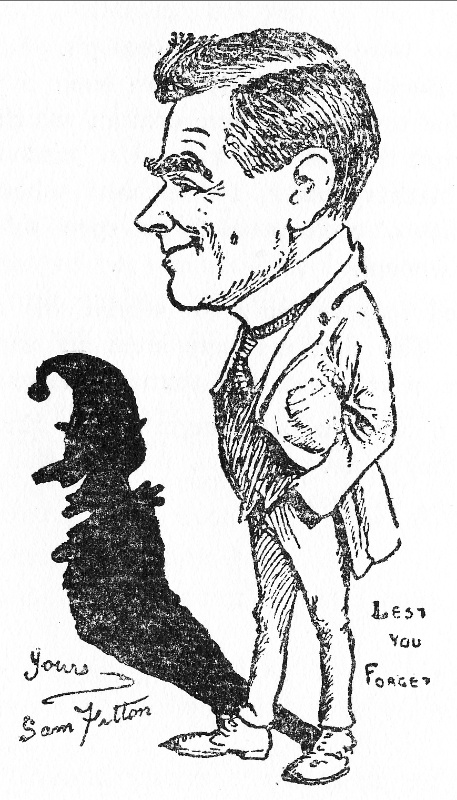
LEST YOU
FORGET.
|
LEST you forget
the visage of your humble,
Kindly peruse the face of long ago:
Mark how it's borne the wheels of Fate, that rumble
And crack the mugs of high as well as low.
Lest you forget, my mug once more be marking:
Look to the lips, the smile that's yet as sweet;
Mark well the eye, that twinkles still with larking,
And notice where the crows have placed their feet.
Lest you forget (you'll note I still keep shaving?)
I am a bare-faced rhymster even yet
I still can make a shadow (see engraving),
Observe the form it takes, lest you forget.
Lest you forget and that you never will sir
I am not old with going on the rant:
I still can chew a chop or sup a gill, sir,
And do the light fandango when I want.
Lest you forget the bad buffoon, who's striven
With feeble jest, whose faults you know full well,
To raise the smile and bring folks nearer heaven,
And tried with ink to quench the flames of hell.
Lest you forget the rustic ruminator,
Who lifts the soul with laughter and with love,
Lest you may dub me "hot-head agitator,"
A Bolshy with a bomb well, see above.
Lest we forget, let wrinkles come with smiling;
To-morrow's grief need not be borne to-day.
When life's hard road is wearisome and riling,
A sense of humour helps to pave the way. |
――――♦――――
Printed in Lancashire
by
Geo. Whittaker & Sons
Eclipse Works
Stalybridge
It is not in the Introduction that
Sam Fitton was a member of the
Lancashire Authors Association. The
Omission is due to carelessness
on my part.
A.W.
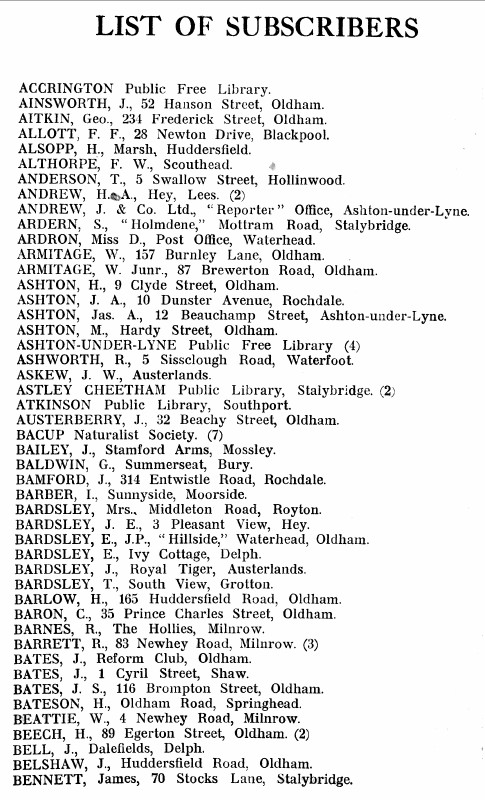
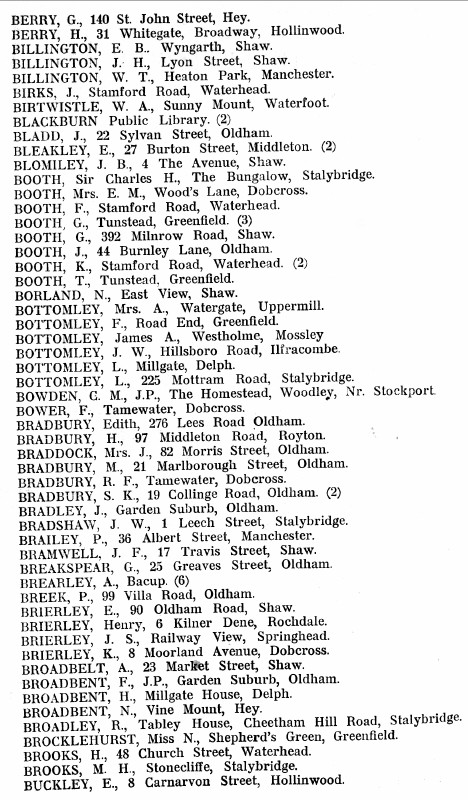
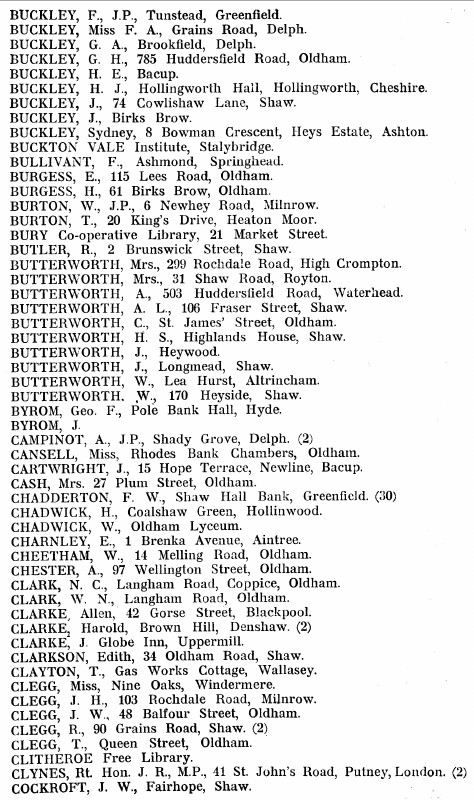
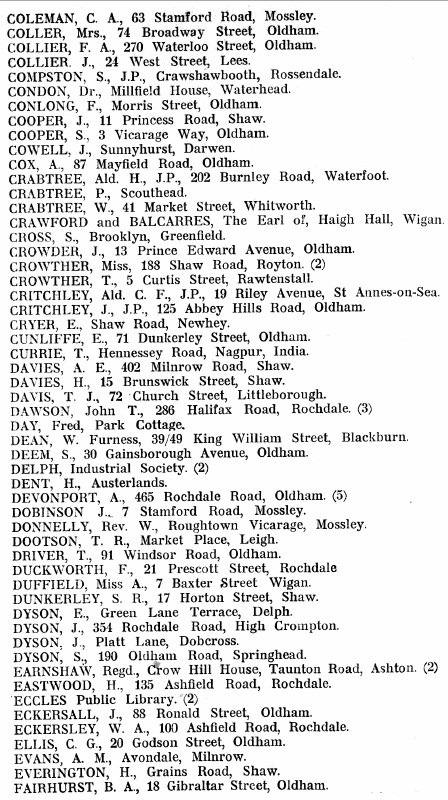
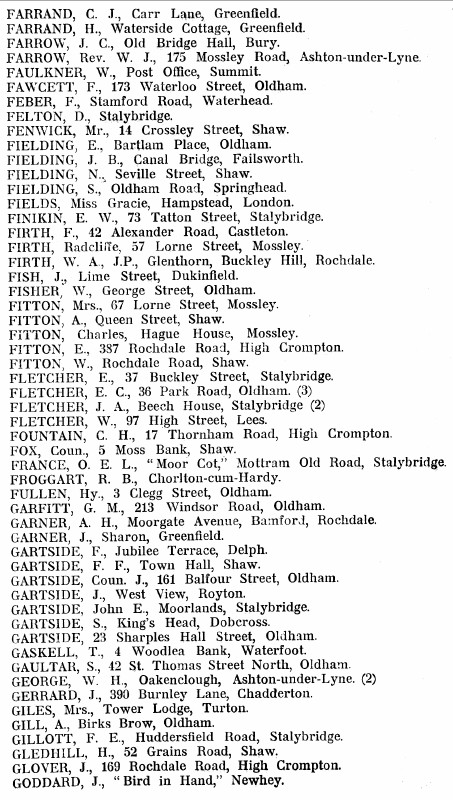
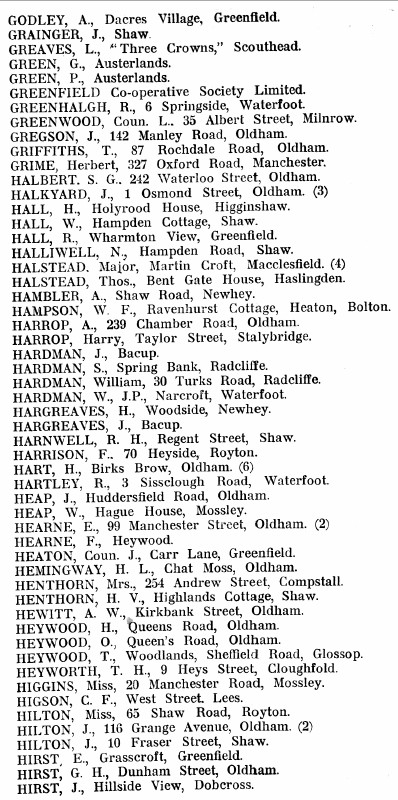
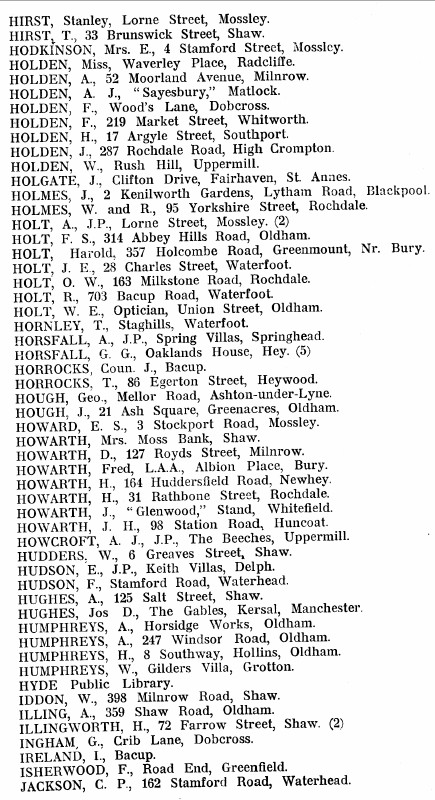
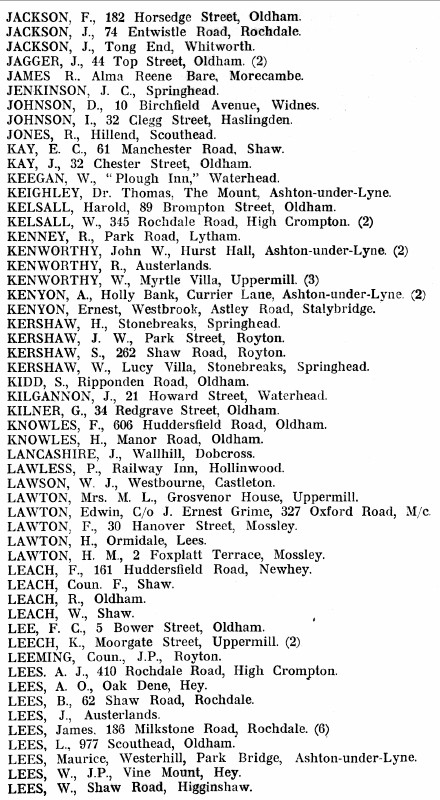
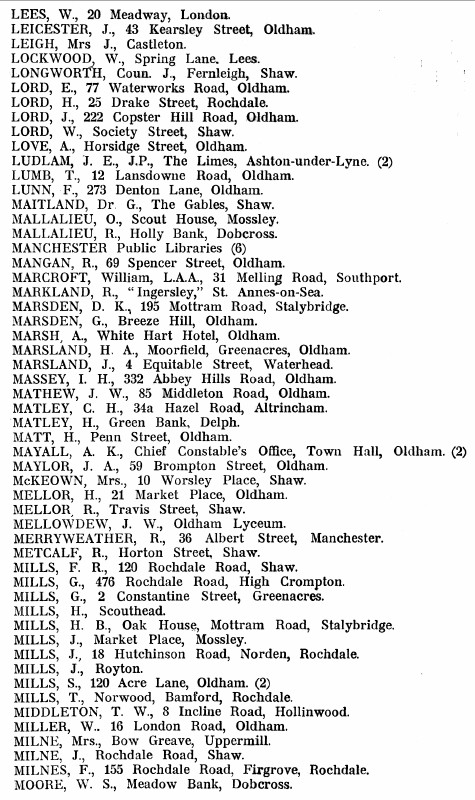
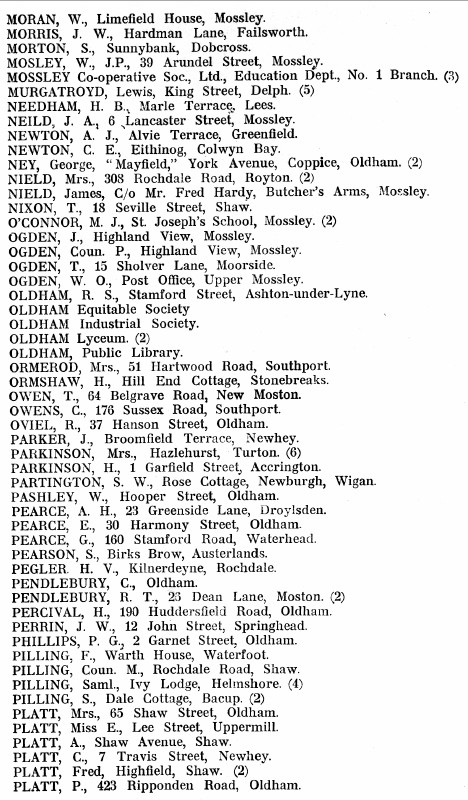
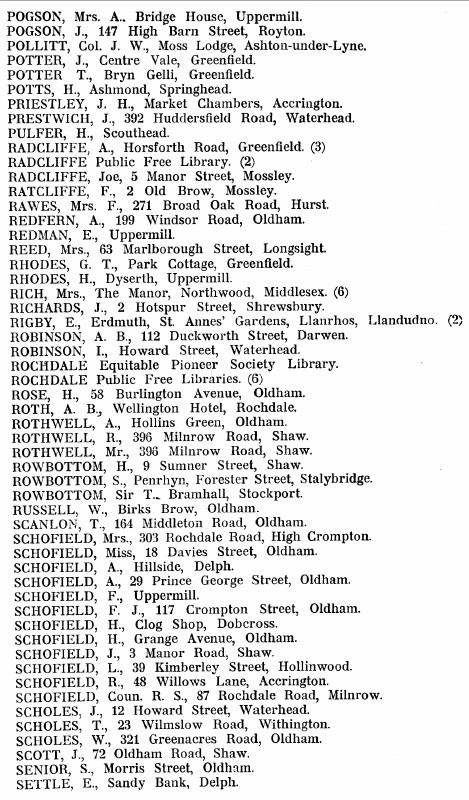
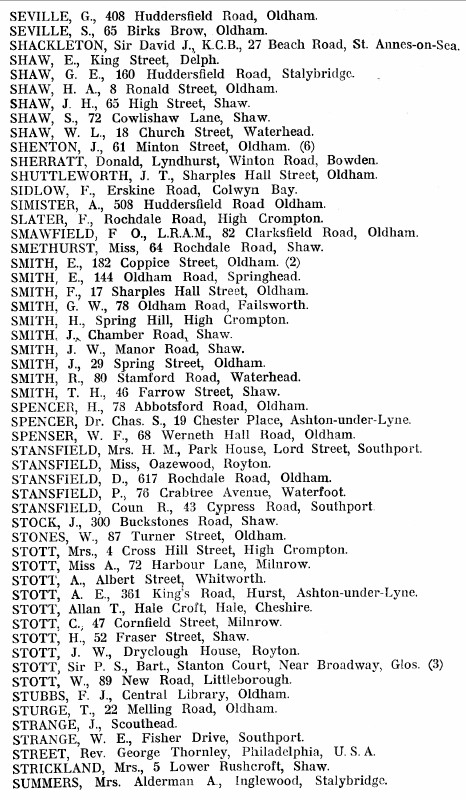
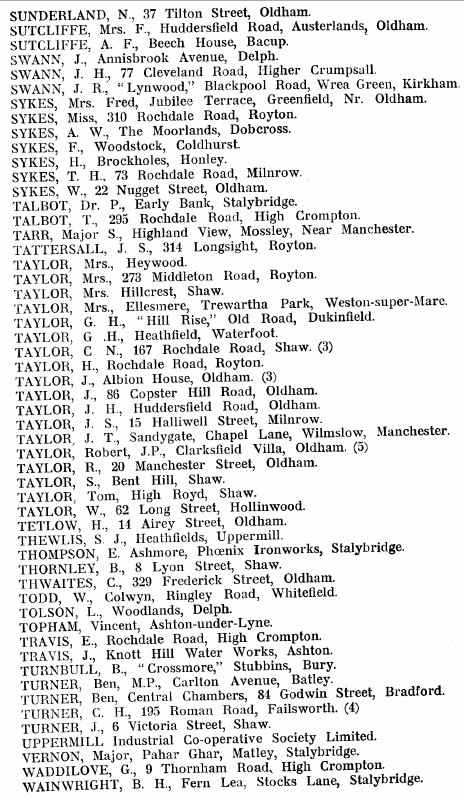
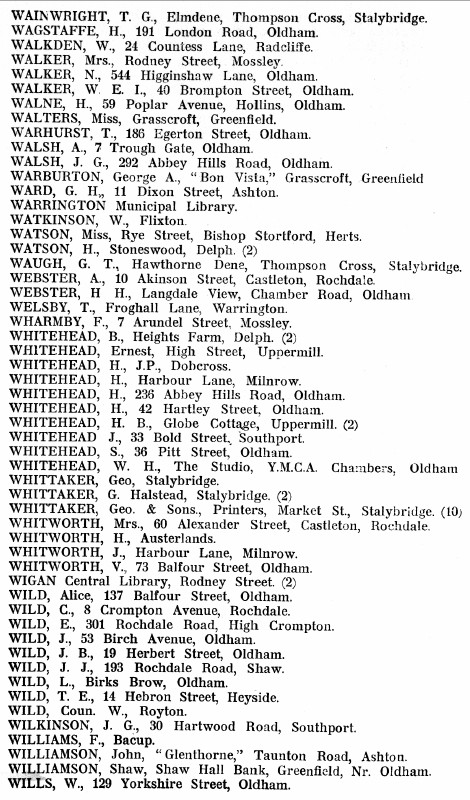
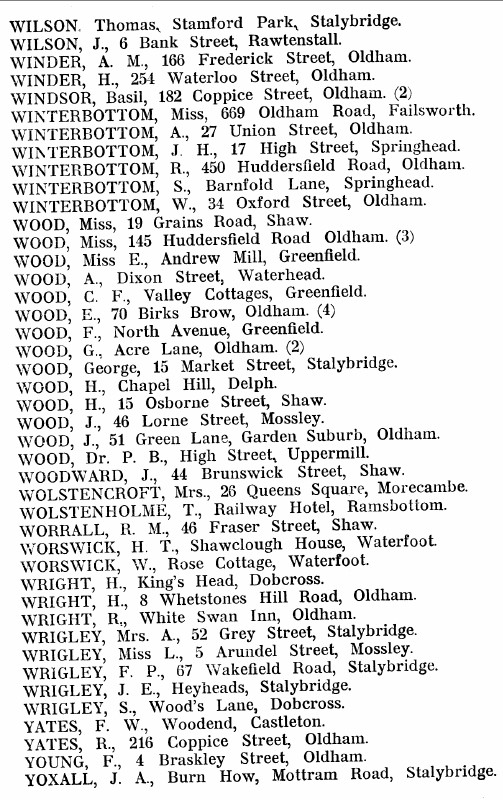
――――♦――――
|
